Huzooraa gives insightful guidance for Jamaat’s workers and speaks of his boundless love for the Community that transcends borders as he reminisces about his past Jalsa duties.
Jalsa Salana UK is now literally around the corner. Mosques in London, and Islamabad of course, are buzzing with excitement and joy already. New faces are seen around Jamaat’s buildings, where accommodation

has been arranged for guests travelling from faraway lands to be part of this spiritual convention.
It is my experience of many years, by the grace of Allah, that in the weeks and
days leading up to Jalsa UK, Huzoor’saa love for this special occasion visibly glows on his blessed face. But this year, I have
Hazrat Ibn Abbasra narrated, “When Allah’s Messengersa was on his deathbed and in the house there were some people, among whom was Umar[ra] bin al-Khattab, the Prophetsa said, ‘Come, let me write for you a statement after which you will not go astray.’ Umar[ra] said, ‘The Prophetsa is seriously ill and
Ahmadiyya Archive & Research Centre (ARC), 22 Deer Park Road, London, SW19 3TL, UK info@alhakam.org | ISSN 2754-7396 THE WEEKLY www.alhakam.org A AL HAKAM | Friday 21 July 2023 | Issue CCLXXIX
advancements: Jalsa Salana UK 2023’s expanded venue, cuttingedge butchery & enhanced traffic control Page 3 A glimpse into Jalsa Salana 1923 Page 17 Page 4 Jalsa Salana: 11 ways to enhance your experience Page 15 Jalsa Salana: A unifying platform in face of challenges of modernity Continued on next page >> ‘Clay
and night, would
heat’ Continued on next page >> Hadith-e-Rasul – Sayings of the Holy Prophet Muhammadsa ﺎﻤﻬﻨﻋ ���ا ﻰﺿر سﺎﺒﻋ ﻦﺑا ﻦﻋ ���ا ﻰﻠﺻ ���ا لﻮﺳر ��ﺣ ﺎﻤﻟ لﺎﻗ ��ﻴﻓ لﺎﺟر ﺖﻴﺒﻟا ��و ﻢﻠﺳو ﻪﻴﻠ� ���ا ﻰﻠﺻ ��ﻨﻟا لﺎﻗ بﺎﻄ��ا ﻦﺑ ��ﻋ ﺎﺑﺎﺘﻛ ﻢ�� ﺐﺘﻛأ ﻢﻠﻫ« ﻢﻠﺳو ﻪﻴﻠ� ��ﻨﻟا نإ ��ﻋ لﺎﻘﻓ .«هﺪﻌﺑ ا��ﻀﺗ �� ﻪﻴﻠ� ﺐﻠ� ﺪﻗ ﻢﻠﺳو ﻪﻴﻠ� ���ا ﻰﻠﺻ ﺎﻨﺒﺴﺣ ،نآﺮﻘﻟا ﻢ�ﺪﻨﻋو �ﺟﻮﻟا ﺖﻴﺒﻟا ﻞﻫأ ﻒﻠﺘﺧﺎﻓ ���ا بﺎﺘﻛ اﻮﺑﺮﻗ لﻮﻘﻳ ﻦﻣ ��ﻨ� ،اﻮﻤﺼﺘﺧﺎﻓ ﻪﻴﻠ� ���ا ﻰﻠﺻ ��ﻨﻟا ﻢ�� ﺐﺘﻜﻳ ��ﻨ�و ،هﺪﻌﺑ ا��ﻀﺗ ﻦﻟ ﺎﺑﺎﺘﻛ ﻢﻠﺳو او��ﻛأ ﺎﻤﻠﻓ ��ﻋ لﺎﻗ ﺎﻣ لﻮﻘﻳ ﻦﻣ ﻰﻠﺻ ��ﻨﻟا ﺪﻨﻋ ف��ﺘﺧ��او ﻮﻐﻠﻟا ﻰﻠﺻ ���ا لﻮﺳر لﺎﻗ ﻢﻠﺳو ﻪﻴﻠ� ���ا .«اﻮﻣﻮﻗ« ﻢﻠﺳو ﻪﻴﻠ� ���ا Allah’s Book is sufficient for us
Spectacular
ovens, blazing day
fill the hall with
<< Continued from previous page
you have the Quran; so the Book of Allah is enough for us.’ The people present in the house differed and quarrelled. Some said, ‘Go near so that the Prophetsa may write for you a statement after which you will not go astray,’ while the others said as Umar[ra] said. When they caused a hue and cry before the Prophetsa, Allah’s Messengersa said, Depart!’” (Sahih al-Bukhari, Kitab al-marda, Bab qawli al-marda qumu ‘anni)
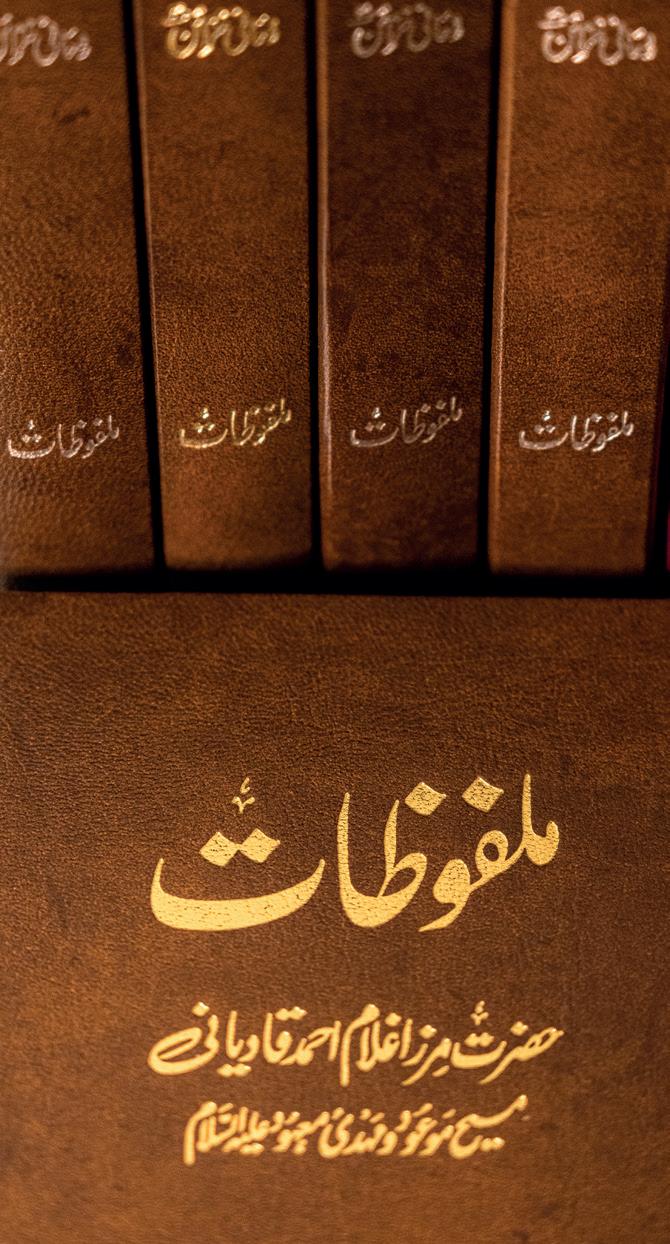
Hazrat Mirza Ghulam Ahmadas, In His Own Words
Guests are not a burden
“Anyone who believes that it is burdensome for them to come here, or who thinks that their staying here will burden me, should fear, for they are guilty of associating partners with Allah. I believe that even if the entire world were to become my household, God Almighty would see to my affairs. I am not burdened in the least. The presence of my friends gives me immense pleasure. Such an idea is an evil thought that must be thrown away from the heart. I have heard people say: ‘Why should we sit here and burden his Holiness? We are useless; why sit here and break bread for nothing?’ Such people must remember that these are satanic thoughts that Satan plants in their hearts so that they may be turned away from here.” (Malfuzat [English], Vol. 2, p. 170)
<< Continued from previous page
witnessed this glow for not weeks or days, but months.
How many thousands are expected to attend; where they are expected to travel from; what is new and what has changed, etc. These and similar thoughts have shone in his conversation whenever Huzooraa has spoken about Jalsa Salana this year; no wonder because Jalsa, in its full bloom, is returning after a few years of what we now call “the Covid years”.
So, what I have witnessed over these past few months is an ocean of love in Huzoor’saa heart waiting to receive his very dear ones – those travelling to the UK and those unable to do so but will be joining as viewers through MTA.
In one of such cherished moments, a few days ago, he asked me, “Is your department’s marquee ready yet?”
I replied that it was due to be ready in a day or two and that I intended to go and check the next day.
He said, “It has been raining all day today and it seems it will rain tomorrow too, but work is in progress. Let’s see what the weather has for us during Jalsa.”
I said, “Huzoor, at least the recent heatwave has subsided.”
Huzooraa replied, “Yes, here it has. But in Rabwah, the heat is still quite harsh and the temperature these days is around 40 or 42 degrees. I don’t know about others, but I always check Rabwah’s weather.”
Before I proceed any further, I would like to pause here and congratulate the Ahmadis living in Rabwah and other parts of Pakistan. This just shows how a bond of love can make you be with someone without physically being around them. The one person who is loved by millions has such love for those who bear the scorching heat of not only the weather but of persecution as well. How can anyone say that the sacrifice of Pakistani Ahmadis has gone in vain?
One afternoon, Huzooraa phoned me to ask regarding some task that he had assigned to me. I had carried out the work and, in my opinion, was confident that it had been carried out well. But Huzooraa pointed out a certain point where the task had fallen short of completion. I apologised and said that I would tend to it immediately. But I want to share a wonderful piece of instruction that I received for the benefit of all.
Huzooraa said, “Whenever you ask your subordinates to perform a task, you should always check thoroughly at the end to see that it has been executed to the letter. One should never leave it to subordinates and sit back, thinking that since they are obliged to do it, they will do it to the best of their abilities. They might be thinking that it is done and they might be truthful in saying so, but since you receive the instruction directly, only you can tell whether what is being reported as ‘complete’, is actually the desired outcome of the actual instruction.”
After this, Huzooraa asked, “Where are you and what were you doing?”
I replied that I was in my Baitul Futuh office.
Huzooraa said, “I thought you would tell me that since it was raining, I was at home having pakoras with tea.”
I enjoyed this light-hearted comment and said, “Huzoor, Jalsa work has taken
over everything and has turned us into labourers.”
Huzooraa said, “Those living here in comfort and ease cannot even imagine what working like a labourer means. It was Jalsas in Rabwah, where people worked like labourers.
“My Jalsa duty was in the Langar Khana, where chapatis were cooked. Clay ovens, blazing day and night, would fill the hall with heat. A certain person who was in charge of our duty would put us to work and wander off. But officials of Jalsa had a very keen eye and would know all those who worked hard and would encourage them in various ways.
“Hazrat Khalifatul Masih IIIrh would join the entire Jalsa workforce for a dinner after Jalsa. Everyone sat on the floor; even Huzoorrh would join the workers in this seating arrangement.
“After one Jalsa, I suffered from a severe headache. I had only just laid down to take some rest when our home phone rang. It was Mir Daud Ahmad Sahib on the other side. He was the Afsar Jalsa Salana in those days. He asked why I wasn’t at the reception with Huzoorrh and I told him about my headache. Also, that the person in charge of my duty had not told me if I was meant to attend.
“Mir Sahib replied that whatever the case was, I had worked day and night through Jalsa and should most certainly attend. And so I did.
“Such were the officials. Mir Sahib would not sign off Jalsa-related announcements with his official title of Afsar Jalsa Salana, but would instead write Khadim Jalsa Salana (a servant of Jalsa Salana).
“These are the examples that officials should follow; knowing who works under them and showing appreciation for those who put all their energies into their assigned tasks; officials who think of themselves as being at the service of the people, and not their masters.”
On another occasion, Huzooraa recalled some other memorable moments from the times when he served in various capacities and mentioned an official who was quite strict. I tried to guess the name, but Huzooraa said:
“Well, I won’t say his name because he was actually a pious person. But I will tell you about another incident involving another officer.
“I had taken time off work and had booked an air ticket for travel. Everything seemed good: my leave approved, travel arrangements made.
“But at the last minute, this official told me plainly that there was a lot of work to be done and, therefore, I could not go on leave. I told him that I had made bookings and all other arrangements, but he remained firm that I was not going anywhere.
“I returned to my desk and put my head down to work. After a little while – I don’t know what went through his mind – he came to me and said that I was allowed to travel as I had planned.
Huzooraa also narrated another similar incident:
“Once, when I was working in the offices, I went to collect my paycheque from the accounts office, only to be told by the accountant that he had been instructed not to issue my paycheque for that month. I asked what had happened, to which he
replied that he did not know and was given that much instruction only.
“Without arguing, I returned to my office and asked the official what the matter was. He told me that he had issued that instruction because I had not completed one of the tasks that he had assigned me.
“I replied calmly by saying that the task was almost complete and also gave him the reasons why a little part of it was still pending. I also made it clear that since I was a waqif-e-zindagi (life devotee), I would not demand for my cheque.
“So, there are officials of all kinds, just as there are subordinates of all sorts. Based on my experiences, I keep reminding officials not to let a situation arise where someone has to make demands; just as I remind subordinate staff never to forget the spirit of waqf-e-zindagi and not make demands. Allah looks after everything Himself.”
Huzooraa further said, “It surprises me when some waqifeen-e-zindagi make certain demands for certain facilities. Wherever I worked, I never thought of demanding anything at all. Some situations were really challenging, but never did I even imagine making a demand.”
With all these words of wisdom from Huzooraa, I was now seeing the term “labourer” as more of an honorific title than a simple word with a simple meaning. I actually felt ashamed that I had even used this term for myself, only because I had done a little bit of work and that too in the comfort and luxury that I have been provided at home and at my offices by Huzooraa
But then, had I not said so, this opportunity of filling all my pockets with these pearls of wisdom – and sharing them with the readers – would never have arisen.
I feel confident that my waqifeen-ezindagi brothers will allow me to say on behalf of myself, and all of them, what I said before Huzooraa:
“Huzooraa! You have kept us so cossetted and endeared that our lives belong to you. May Allah bless us such that we never succumb to ingratitude. May we invest every drop of our time, energy and any skills that we may have in the way of Allah the Almighty – the way that you call us all to. Amin.”
What started with a mention of Rabwah, must end at Rabwah. When Huzooraa spoke about seasonal dishes, he also said:
“With pakoras (bhajis) we would also have puray (pancakes). You know how puray are made, don’t you?”
I replied in the negative, upon which Huzooraa briefly explained the recipe, before adding:
“So when the weather was pleasant in Rabwah, we would have pakoray, puray and some tea. In those simple days, this was more than a luxury to us.”
My dear Ahmadi brothers and sisters living in Pakistan! We salute your sacrifices in the way of your Faith. Your beloved master thinks day and night of your days and nights. What a blessed reward!
May this Jalsa be a huge success and may every Jalsa that follows be a huger success than the previous. May we also never forget the spiritual side of this unique event. Amin.
(Asif M Basit)
Friday 21 July 2023 | AL HAKAM 2
Photo courtesy of Suhaib Ahmad
Spectacular advancements
Jalsa Salana UK 2023’s expanded venue, cutting-edge butchery & enhanced traffic control
Zaheer
Khan
Missionary and Naib Afsar Jalsa Salana UK
With Jalsa Salana UK 2023 around the corner, preparations are in full swing, and the 28-construction period at Hadeeqatul Mahdi officially started on 11 July 2023.
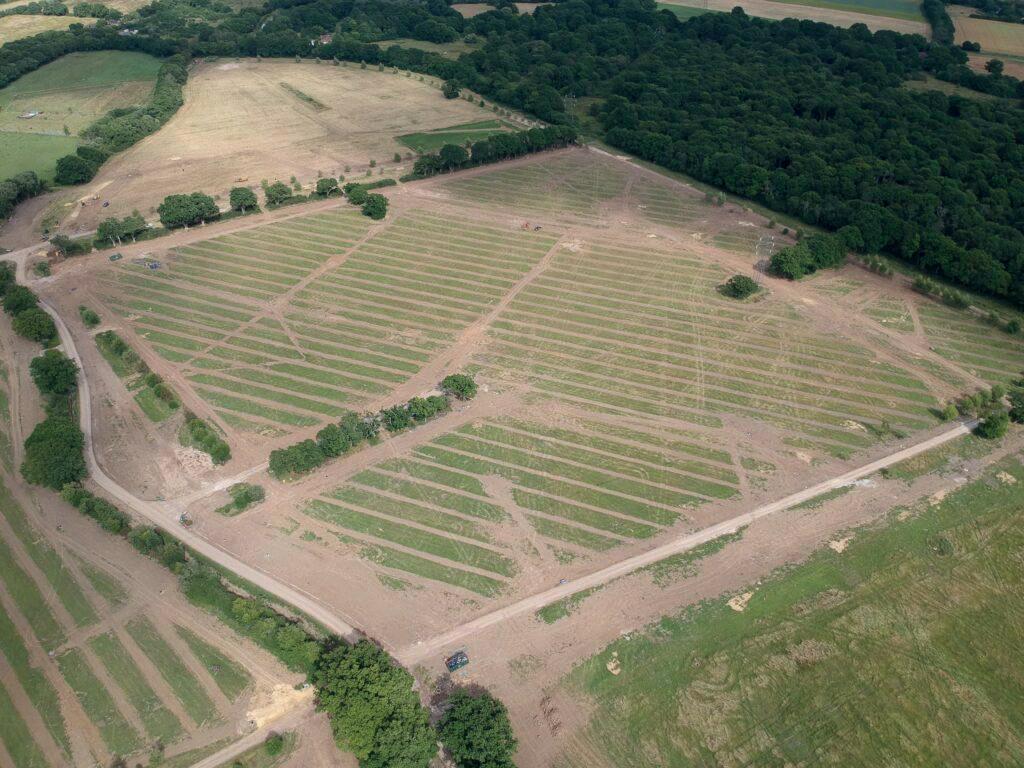
The management meetings for Jalsa Salana UK started in January 2023. This Jalsa will be the first post-Covid Jalsa Salana UK that is free from the capacity restrictions that the pandemic brought with it. The last Jalsa UK to be held without pandemic restrictions was in 2019. Though the capacity restrictions have been lifted, all guests will be required to wear face masks within the main marquee.
Instructions from Hazrat Amirul Momineenaa
We received instructions from Hazrat Khalifatul Masih V, may Allah be his Helper, to prepare for an attendance of 50,000 attendees and to make arrangements accordingly. Keeping this in mind, the main marquees for both the men’s and women’s sides have been increased this year; the women’s main marquee has been increased by 40 metres in length, allowing a larger number of attendees, and the men’s side has increased by 5 metres, taking it to maximum capacity. The main marquee sizes are as follows:
Men’s main marquee: 50m (W) x 145m (L)
Ladies’ main marquee: 50m (W) x 140m (L)
The main marquees have air conditioning systems in place to ensure the temperature is cool and comfortable, and the accommodation marquees will be equipped with heaters to ensure Jalsa guests are able to rest without discomfort. This year, more than 50 marquee companies were contacted for quotes, and 20 companies have been used for various marquees. The amount and sizes of marquees have also increased compared to the last full-fledged Jalsa in 2019.
New butchery
Hazrat Khalifatul Masih Vaa also instructed us to install a new butchery at the Jalsa site where all the slaughtered meat bought from local, regional, and national suppliers would be cut and prepared by Ahmadi volunteers for the Jalsa Salana kitchen. Accordingly, a new and well-
equipped butchery has been established, accompanied by a 40-foot chiller to store the meat.
The benefit of having a butchery is that a lot of costs will be cut and savings made. Along with this, the meat for the guests will be fresher, and we have also made conditions to the suppliers that they must provide us with the highest quality meat.
New lunch and dinner arrangements
A new takeaway service will be available this year from the car park. Those guests who wish to take their dinner home can do so from the car park food service point, without the need to queue up in the main dinner marquee. The dinner will be ready in takeaway containers to be picked up; therefore, all guests are instructed not to bring any containers of their own. All containers will be provided at the takeaway
service point. Along with the aloo gosht and daal menus, a pasta dish will be added for those wanting it. 40 new burners have also been added in a separate place to the main kitchen to aid any extra needs.
New ‘Exhibitions Road’
All the historical and educational exhibitions have come together under one roof this year. A dedicated marquee has been set up in which guests will be able to view the various exhibitions on display. Other exhibitions will also be in the same area.
The Lajna will have special timings for viewing the exhibitions – the first will be on Saturday, 29 July following the address of Hazrat Amirul Momineenaa and remain until 15 minutes before maghrib prayers. The second viewing time for Lajna will be on Sunday 30 July from after Zuhr prayers up until the final session.
Road traffic
To reduce traffic around the Jalsa site, some roads have been widened and expanded, and new roads have also been laid. A new two-way traffic system will ease the traffic conditions at Hadeeqatul Mahdi.
A blessing of Khilafat
Last year, Hazrat Khalifatul Masih Vaa instructed the installation of a water drainage system at the Jalsa site to prevent water logging, which had caused significant disruption for vehicles in the past.
This year, during the 28-day construction period at Hadeeqatul Mahdi, the area experienced heavy rainfall, leading to the formation of large water puddles. However, unlike previous years, when the water would persist on the surface, the newly installed drainage system efficiently
Continued on page 5 >>
3 AL HAKAM | Friday 21 July 2023
Aerial shot of Hadeeqatul Mahdi where lines of drainage systems can be seen
Jalsa Salana 11 ways to enhance your experience
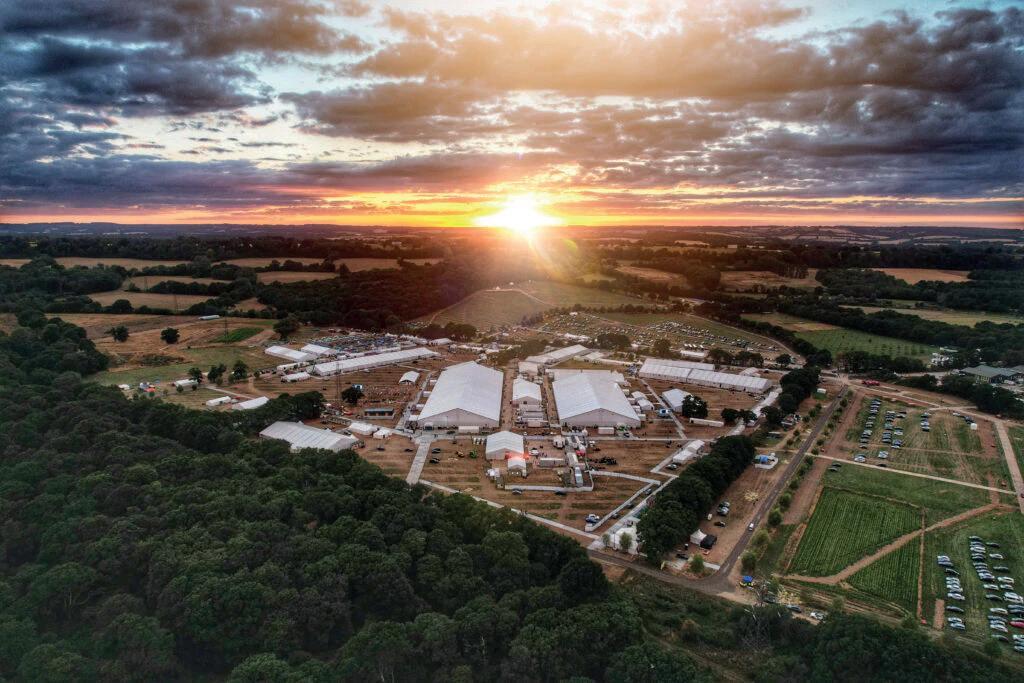 Jalees Ahmad Al Hakam
Jalees Ahmad Al Hakam
1) Be prepared: Know why you’re attending
In all our actions, decisions, and intentions, it is crucial to consider the meanings behind the destinations we choose. The Promised Messiahas emphasised the extraordinary nature of jalsas, emphasising that they are not ordinary gatherings. Jalsas carry immense importance, and it is only by comprehending their significance that we can fully benefit from them. To familiarise yourself with Jalsa Salana and its significance for the Jamaat, please visit the following link: www.alhakam.org/jalsa-salana-andits-importance-for-the-jamaat/
And so, reminding oneself of why one is attending becomes the first step to optimise the Jalsa experience.
2) Spiritual growth
Spiritual growth plays a significant role in Jalsa. When we attend a religious gathering, our intention is to foster our spirituality and reaffirm our faith in God.
Hazrat Ahmadas has stated that the primary purpose of this convention is to enable every sincere individual to personally experience religious benefits. They may enhance their knowledge, and due to their being blessed and enabled by Allah the Exalted, their perception of Allah may progress.
3) Things to pack: Keeping in mind arrival, health and weather
When travelling or journeying to any location, it is essential to do some research on the destination. And so, as Hadeeqatul Mahdi is located in Alton, UK, here are some items you should consider including in your packing list and some matters to keep in mind:
(I) Weather-appropriate clothing: Check the weather forecast for Alton and pack clothing suitable for the expected conditions. This may include light and breathable clothing for hot weather or layering options for cooler temperatures.
(II) Sturdy footwear: Choose comfortable shoes suitable for outdoor activities in the countryside. If rain is expected, consider packing a spare pair of waterproof shoes or wellies.
(III) Personal care items: Remember to pack essentials such as sunscreen, insect repellent, and any necessary medications. Additionally, consider any specific personal care items you might need based on your preferences or requirements.
(IV) Translation kit (if needed): If you require a translation kit, make sure to bring one you have purchased beforehand. Alternatively, there are usually arrangements on the Jalsa site to purchase a translation headset.
4) Faith-inspiring speeches
One of the major takeaways from Jalsa is undoubtedly the speeches. The faithinspiring speeches are the main highlight of the Jalsa, and it is when we are able to retain every word of Hazrat Khalifatul Masih Vaa and act upon them that we can truly say we have gained significant benefits from Jalsa. Therefore, it is recommended to bring a small notebook to take notes and jot down the standout points during the sessions to enhance your Jalsa experience.
Continuously revisiting these notes can be extremely beneficial. It is also worth mentioning that the other speeches delivered by the elders of the Jamaat are worth listening to. Hazrat Khalifatul Masih Vaa has always encouraged attendees to make full use of their time at Jalsa and actively listen to those speeches.
By emphasising the importance of taking notes and attentively listening to all speeches, one can ensure they don’t return
from Jalsa empty-handed.
5) Bring your curious mind
After the sessions of the day, or even during lunch break, it would be a good idea to go out and stretch one’s legs to improve blood circulation and prepare oneself for the next session or the proceedings of the following day. This time can be used to visit various exhibitions at the Jalsa site. For example, the Ahmadiyya ARC (Archive & Research Centre) will be showcasing historical manuscripts relating to the Jamaat. The Review of Religions, IAAAE, Humanity
First, Makhzan-e-Tasaweer and others will also be hosting a variety of exhibitions. Furthermore, one can use this time to visit the Ahmadiyya Book Stall and purchase any new publications or books of the year to add to their personal library.
6) Connecting across continents
The Jalsa is a unique opportunity to meet people from diverse backgrounds, countries, and continents—an experience not found every day. If you think about it, you’ll realise that it’s a truly spiritual and emotional spectacle. Just imagine a gathering where individuals from all corners of the world come together in one location, standing
Courtesy of MTA
shoulder to shoulder in prayer, united under one Imam, the Khalifatul Masihaa Take advantage of this time to learn about different cultures; engage in conversations and discover the incredible journeys that people have undertaken to embrace Islam Ahmadiyyat. The sense of brotherhood and sisterhood within the Jamaat is something that the Promised Messiahas and his Khulafa have consistently encouraged. (“Foster harmony, love, and an atmosphere of mutual trust.”, www.alhakam. org/japan-amila-meets-huzoor/)
7) Engaging children in exploring the Jalsa site
Most of our youngsters may be unaware of the tremendous effort that goes into transforming the 206-acre site. During Jalsa, a lot of manpower is involved in converting the 206 acres into a spiritual tent city. Various marquees, offices and exhibitions are erected and set up. One can take this opportunity to explore the Jalsa site with their children and teach them about the importance and effort required to create a tent city for three days. Furthermore, parents can educate their youngsters about
Friday 21 July 2023 | AL HAKAM 4 Continued on next page >>
the inception of the Langar Khana Hazrat Masih-e-Maudas, and how the kitchen of Hazrat Syeda Nusrat Jehan Begumra was the first-ever Langar facility at Jalsa Salana. ( www.alhakam.org/hospitality-a-specialtrait-of-the-prophets/)

8) Being on time for maximum Jalsa experience
The three days of Jalsa are an exceptional opportunity to rejuvenate one’s faith and strengthen their bond with God. There is a well-known hadith that states that when there is a gathering in which Allah is exalted and remembered, angels pray for all those who are present. (Sahih Muslim, Kitab azzikri wa d-du‘a’i wa t-tawbati wa l-istighfar) Therefore, in order to fully benefit from the Jalsa sessions and the scheduled timetable, it is important to be punctual. This may require leaving home earlier than scheduled to avoid traffic. Make sure to carefully review the Jalsa programme to ensure that you do not miss out on the speeches and other exceptional activities planned, so that you don’t leave the three days emptyhanded. (jalsasalana.org.uk/programmejalsa-salana-uk-2023/)
9) Cultivating connections: Tea and international bonds at Jalsa
It is often remarked that sharing a cup of tea with someone strengthens the bond of friendship. Give it a try! During this Jalsa, as you meet new people from different countries, take the opportunity to have tea together and get to know them. Additionally, meal times can be used to engage with individuals from diverse nations that you wouldn’t typically interact with. Consider it a chance to experience and learn about various countries, cultures and backgrounds over a simple cup of tea.
10) International bai‘at
Before arriving at the Jalsa site, we should remind ourselves of why we have accepted the Messiahas of the age and how we can become complete followers of the Messiahas, who was foretold to come in the Latter Days by the Holy Prophet Muhammadsa
As we remind ourselves of this reality, it is important to review the conditions of bai‘at since this UK Jalsa is also unique in the sense that the international bai’at, usually takes place. (www.alhakam.org/what-is-baiat/)
11) Prioritise preparation, shared responsibilities, and children’s care
Listening to the speeches at Jalsa is an essential aspect that cannot be emphasised enough. Therefore, it’s crucial to be fully prepared and ready.
One approach parents can take is to share the responsibility of looking after the children. For instance, on Saturdays, when Hazrat Khalifatul Masihaa delivers his speech at the Lajna marquee, husbands can take over and care for the children so that the wives are able to listen to Huzoor’saa speech with undivided attention. There is a distinction between merely listening to a speech and actively engaging with it, attentively taking note of all the aspects mentioned.
<< Continued from page 3
cleared the puddles within two days. As a result, the construction work continued smoothly without significant hindrance. This is another blessing of Khilafat, which we have witnessed as the drainage system was installed according to Huzoor’s instructions, and now we are witnessing its benefits.
According to Huzoor’s instructions, the drainage system has been covered with rocks rather than mud, to ensure the water properly drains downwards.
Duty inspection
The inspection by Hazrat Khalifatul Masih Vaa of the Jalsa Salana site will take place one week prior to the Jalsa Salana, on Sunday, 23 July. InshaAllah. We are expecting 8,000 volunteers to be in attendance.
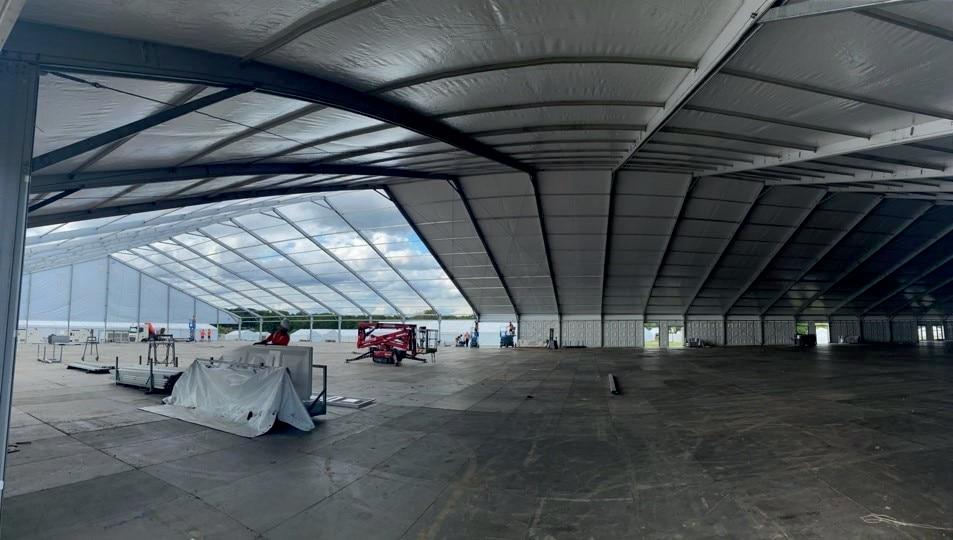
Other developments
• An “Event Management Centre (EMC)” has been created this year, which is required by law and has been established to address all emergencies, etc.
• The Jalsa store is being loaded with various supplies, including foodstuff, sanitary supplies, water and much more.
• EE signal boosters have been installed for better internet and phone signal connectivity. Fibre optic cables have also been laid for the various departments.

• As of 20 July, Khuddam have started waqf-e-arzi in Hadeeqatul Mahdi and according to reports from Sadr Khuddam-ul-Ahmadiyya UK, more than 100 Khuddam from 21 regions have come forward to volunteer.
• Arrangements have also been made to ensure that newly-arrived Ahmadis who do not have the means available to travel to Hadeeqatul Mahdi for the Jalsa, are given lifts to the site.
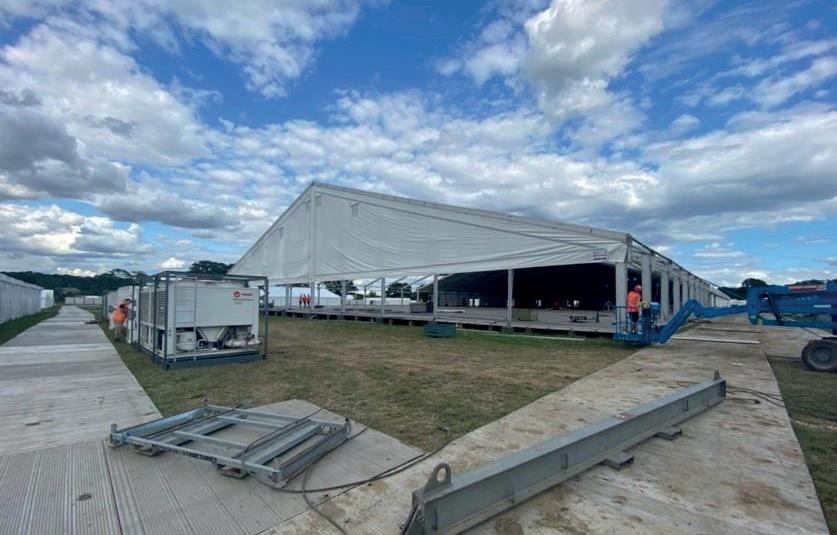
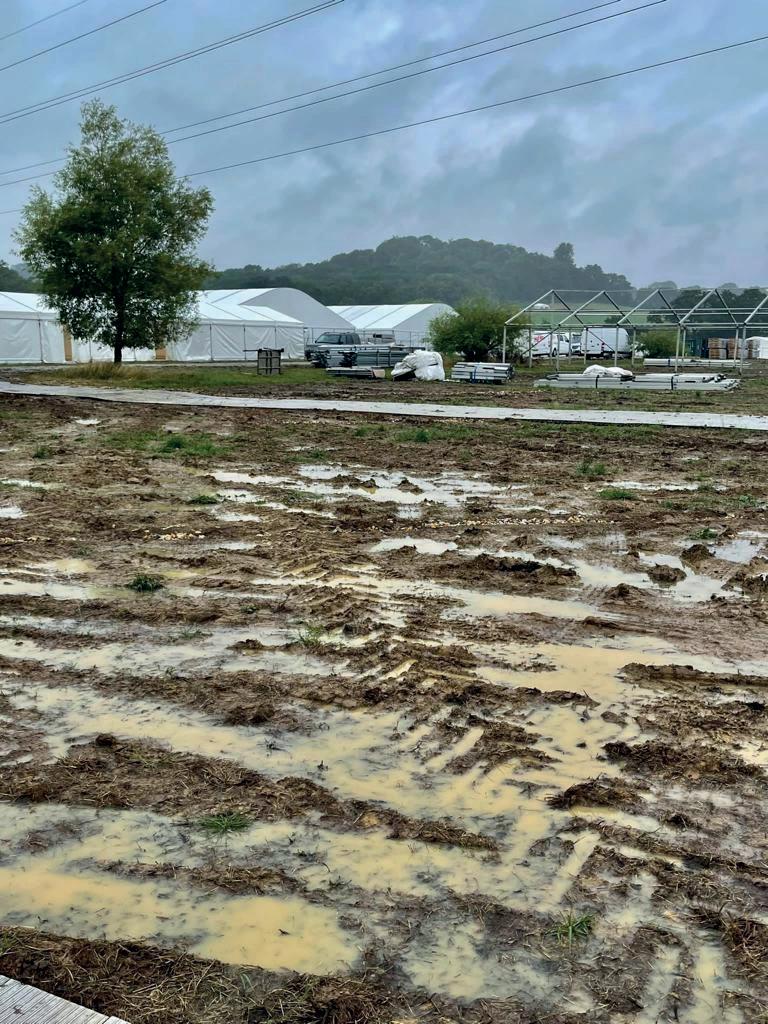
• The overall parking capacity of the site has been increased now due to improved ground conditions, with the addition of the drainage system.
• 12-15,000 duty badges have been issued along with car passes. Members can obtain their car passes from their local sadran
• The roti (flatbread) plant has been started and will be ready soon.
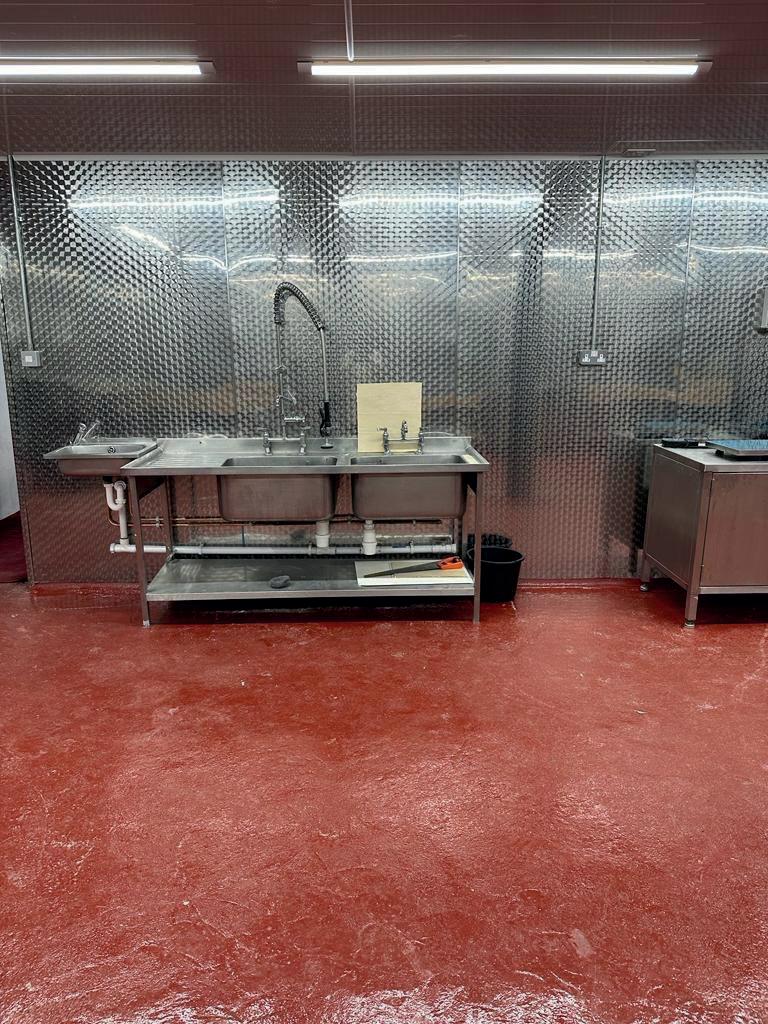
• The water has undergone safety tests, and water reserves are ready.
• Out of the 1200 metres of metal tracks laid around the Jalsa Site, 70% has been completed.
• 80% of the hired cabin toilets have been set up, 40% of the showers have been installed, and 80% of the cabins have arrived.
• The various departments that are working at the moment on the sites include Site, Kitchen, Electricity, Communication, Mehman Nawazi (food service), Maintenance, Water Supply, Khidmat-e-Khalq and more.
5 AL HAKAM | Friday 21 July 2023
<< Continued from previous page
Due to the drainage system installed, the water puddles disappeared quickly
The Jalsa store – the main suppliers for everything, from water to plates and much more
The ladies’ main marquee, being set up
Newly installed butchery
together nicely
The Jalsa site coming
This Week in History
A glimpse into the rich history of the Ahmadiyya
Muslim Jamaat
21 July
21 July 1898: On this day, the Promised Messiahas wrote a letter to Hazrat Nawab Muhammad Ali Khanra and dispatched Marham-e-‘Isa (i.e., the Ointment of Jesussa, also known as the Apostle’s Ointment) to him. (Maktubate-Ahmadiyya [2008], Vol. 2, p. 227)
21 July 2006: During his Friday Sermon on this day, Hazrat Khalifatul Masih Vaa said that the then President of Sierra Leone, Dr Ahmad Tejan Kabbah, had come to offer the Jumuah prayer at the Baitul Futuh Mosque in London. Huzooraa introduced the distinguished guest and said that he had expressed his desire to offer the prayer here. Huzooraa prayed that Allah the Almighty may fulfil his pious wishes, reward him, and establish lasting peace and security in his country. Huzooraa also graced a reception held in honour of the distinguished guest.
22 July
22 July 1955: During his tour
of Europe, on this day, Hazrat Musleh-e-Maudra presided over the first-ever international conference of Ahmadi Missionaries, which lasted for three days. For more details, see “First-ever international conference of Ahmadiyya missionaries, London, 1955”, Al Hakam, 21 July 2023, Issue 279, p. 16)
22 July 2016: On this day, Chris Grayling MP, the then Secretary of State for Transport, UK, had the opportunity to meet Hazrat Khalifatul Masih Vaa at the Baitul Futuh Mosque, London. (“Transport Secretary visits Head of Ahmadiyya Muslim Community”, www. pressahmadiyya.com)

23 July

23 July 1933: On this day, Hazrat Musleh-e-Maudra drew the attention of members of the Jamaat towards learning the Urdu language. Huzoorra said that deriving benefit from the books written by the Promised Messiahas was the best and most efficient way to learn Urdu. Huzoorra stated that where, on the one hand, the Promised Messiahas restored religious matters, at the same time,
he also reformed the Urdu language. A person wrote a thesis as part of his PhD degree at London University. In his thesis, he stated that the Promised Messiah’sas writings had had a great impact on the Urdu language. (Tarikh-e-Ahmadiyyat, Vol. 6, p. 117)
23 July 1938: Two Christian missionaries from Spain and Belgium reached Qadian and had an audience with Hazrat Muslehe-Maudra on this day. One guest was Mr Pareja MA, who was from Spain and had graduated from Cambridge. He was a professor at St Xavier’s College, Mumbai. The other guest was Mr Francis. He was from Belgium and was posted in the Amritsar area. Before meeting with Hazrat Musleh-e-Maudra and having the opportunity to ask him various questions, the guests were shown various institutions and offices of the Jamaat in Qadian. (Tarikh-eAhmadiyyat, Vol. 7, p. 545)
24 July
24 July 1910: On this day, Hazrat Khalifatul Masih Ira journeyed
towards the city of Multan to record his witness statement in a case in a government court. Hazrat Khalifatul Masih Ira appointed Hazrat Sahibzada Mirza Bashir-ud-Din Mahmud Ahmadra as the amir in his absence from Qadian. Hazrat Khalifatul Masih Ira returned to Qadian on 26 July. (Tarikh-e-Ahmadiyyat, Vol. 3, p. 321)
24 July 1955: On this day, during his second tour of Europe, Hazrat Khalifatul Masih IIra, along with Hazrat Chaudhry Muhammad Zafrulla Khanra and other members, visited Kew Gardens, London.

25 July
25 July 1912: On this day, Hazrat Khalifatul Masih Ira laid the foundation stone of a new building for Talim-ul-Islam High School in Qadian. (Tarikh-e-Ahmadiyyat, Vol. 3, p. 312)
25 July 1913: On this day, Hazrat Chaudhry Fateh Muhammad Sayalra reached England. He was appointed and sent there as a missionary by Hazrat Khalifatul Masih Ira. (Tarikh-e-Ahmadiyyat,
Friday 21 July 2023 | AL HAKAM 6
Hazrat Khalifatul Masih IIra and Hazrat Chaudhry Muhammad Zafrulla Khanra
Chris Grayling MP, the then Secretary of State for Transport, UK, meeting with Hazrat Khalifatul Masih Vaa
Vol. 3, p. 458)

25 July 1924: Hazrat Khalifatul Masih IIra was an ardent lover of the Holy Prophet Muhammad, peace and blessings of Allah be on him.
On this day, while travelling to Europe, when his ship approached the coast near Mecca, Huzoorra ascertained that his ship was cruising directly towards the Baitullah (Ka‘bah) in Mecca. On this blessed occasion, Huzoorra offered two rak‘aat [units of prayer] of voluntary prayer in congregation with his entourage. During this time, Huzoorra remained engaged in fervent prayers. He recited Surah al-Nazi‘at in the first rak‘ah and Surah al-A‘la in the second. He prayed for a longtime during prostration; at times, the sound of his fervent supplications could be heard by others. The narrator, Hazrat Sheikh Yaqub Ali Irfanira, writes that the scene could not be described in words. (Tarikh-eAhmadiyyat, Vol. 4, p. 439)
25 July 1931: On this day, the All-India Kashmir Committee was established at Simla, and Hazrat Mirza Bashir-ud-Din Mahmud Ahmadra, Khalifatul Masih II, was elected as its first president.
For more details, “Hazrat Mirza Bashiruddin Mahmud Ahmad’sra services to the Muslim cause: Guidance for Turkey, peace in the Arab world and the Kashmir Movement” (Al Hakam, 19 February 2021, Issue 153, pp. 42-43)
26 July
26 July 1940: Hazrat Musleh-eMaudra announced the establishment of Majlis Ansarullah, an auxiliary organisation of Ahmadi men aged above 40 years. He appointed Hazrat Maulvi Sher Alira as its president. Huzoorra also announced some core amendments regarding the auxiliary organisation of Ahmadi youth. Atfalul-Ahmadiyya was also announced on this day, an organisation of Ahmadi
156th Canada Day celebrated in Brampton
Syed Mukarram Nazeer Canada Correspondent
boys. Huzoorra made membership in these organisations compulsory for Ahmadis in that age range. (Tarikhe-Ahmadiyyat, Vol. 8, p. 70)
26 July 1967: On this day, Hazrat Khalifatul Masih IIIrh departed for England from Denmark. At the London Heathrow airport, hundreds of Ahmadis, including Hazrat Chaudhry Sir Zafrulla Khanra and Hazrat Maulvi Qudratullah Sanaurira, were present to welcome Huzoorrh. The press correspondents asked Huzoorrh about the chances of the establishment of peace in the world. Huzoorrh answered that if Man continued to ignore his Creator and did not form a living relationship with Him, the world would continue to move towards horrific destruction. (Tarikh-eAhmadiyyat, Vol. 24, p. 134)
27 July
27 July 1896: The Promised Messiah’sas prophecy about Abdullah Atham was fulfilled on this day when this Muslim-born Christian missionary departed the world in Firozpur. He was a representative of the Christian camp against the Promised Messiahas at Amritsar during, Jang-e-Muqaddas, the famous debate of 1893. For more details, see “Abdullah Atham”, www.ahmadipedia.org).
27 July 1910: On this day, Hazrat Khalifatul Masih Ira graciously approved the request of dignitaries from the city of Multan and delivered an insightful speech. A large gathering thronged to benefit from this address, delivered in the hall of Madrasa Anjuman Islamiya. (Tarikh-e-Ahmadiyyat, Vol. 3, p. 322)
27 July 1955: Hazrat Muslehe-Maudra was in London, where a blessed soul from Malta, who was an engineer by profession, accepted Ahmadiyyat. In this way, the Jamaat was established on a small island in the Mediterranean Sea. (Tarikh-e-Ahmadiyyat, Vol. 16, p. 549)
Each year on 1 July, Canadians celebrate the anniversary of the formation of the Canadian Confederation, which took place on 1 July 1867. On this day, the three colonies of Canada, Nova Scotia, and New Brunswick united into a single Dominion named Canada, within the British Empire. Originally named Dominion Day, it was renamed Canada Day in 1982.
Canada Day is celebrated with a patriotic spirit. Celebratory ceremonies are held all day long with live performances, stalls, activities for children, and food for all. Fireworks in the evening bring the day to an end. The largest single Canada Day event is held in Canada’s capital city, Ottawa.
Jamaat-e-Ahmadiyya Canada also celebrates Canada Day with full patriotic zeal. All major jamaats and imarats across Canada, including Brampton, Calgary, Edmonton, Hamilton, Montreal, Ottawa, Saskatoon, Toronto, Vancouver, Vaughan, and Winnipeg, hold this event. Local dignitaries, including First Responders, Councillors, Mayors, MPPs (Members Provincial Parliament), Provincial Ministers, MPs (Members Federal Parliament), and Federal Ministers also attend.
One such event was held jointly at the Mubarak Mosque in Brampton by Brampton East Imarat and Brampton West Imarat.
Flag hoisting ceremony followed by silent prayer led by Amir Jamaat-eAhmadiyya Canada Lal Khan Malik Sahib started the day and also presided over the session.
The formal event started with the
recitation from the Holy Quran with its English translation, followed by the national anthem of Canada, first in English and then in French.
Community Activist and Master of Ceremony, Jake Dheer read the Land Acknowledgement Statement, recognising the rights of Aboriginal people on the land of Canada. In his opening remarks, Amir Sahib welcomed all guests and emphasised the importance of one’s loyalty to their country in Islam.
Mayor of the City of Brampton Patrick Brown, the first speaker, stated that Brampton City Council has unanimously declared the month of July “Ahmadiyya Heritage Month”, and passed a motion, paving the way for a new traffic light to be installed at the South Entrance of the mosque and for it to be officially named, “Ahmadiyya Gate”.
Messages from the Prime Minister of Canada, Justin Trudeau, and the Premier of Ontario, Doug Ford, were read out. Various dignitaries also shared their thoughts. These included politicians, senior members of local police, fire, and emergency services, media personalities, and Rotary Club office bearers. Appreciation of Jamaat-e-Ahmadiyya Canada’s efforts in hosting the event and becoming a positive contributing member of society was the common underlying theme.
Amir Brampton East Imarat and Amir Brampton West Imarat jointly thanked all guests for attending the event.
Amir Sahib Jamaat-e-Ahmadiyya Canada led the silent prayer, and thus the formal part of the event ended.
An estimated 700 people attended the event.
Eid-ul-Adha celebrated across USA
Jamaat-e-Ahmadiyya USA celebrated Eid-ul-Adha with great enthusiasm on 28 June 2023. Thousands of members offered Eid prayers at various mosques and salat centres across the country.
Jamaat members residing in Maryland and Washington, DC, offered Eid prayer at the national headquarter, the Baitur Rahman Mosque in Silver Spring, and the Fazl Mosque in Washington, DC. Altogether, almost 1,100 members had gathered.
Eid al-Adha gatherings were also organised in various mosques in Virginia.
The members of the South Virginia Jamaat offered the prayer at the Masroor Mosque, where 1,100 people took part. Eid gatherings were also held in different cities in New York State, such as Syracuse, Albany, Willingboro, and New York City, where more than a thousand members offered Eid. In Pennsylvania, Eid gatherings were organised in the Lehigh Valley and Philadelphia, where 425 people offered prayer. In Houston, Texas, the Eid gathering was held at the Baitus Sami’ Mosque, where 500 people offered Eid prayer. In California, Eid gatherings were held at the Bait Hameed Mosque in Bay Point and Chino, where 820 people offered Eid prayer.
7 AL HAKAM | Friday 21 July 2023 21 - 27 July
Mirza Maaz USA
M Adam Ahmad
Al Hakam

Prophets of Allah the Almighty consider it a divine duty to treat their guests with the utmost respect because they view them as a sign of God’s blessings. In addition to showing great hospitality, the messengers of God Almighty take this opportunity to help improve the spiritual and moral condition of those who come to benefit from their company.
From the Bible to the perfect book of Allah the Almighty, the Holy Quran, the sacred scriptures are replete with examples of various prophets extending exceptional hospitality to guests. All these accounts, from Prophet Abrahamas serving his guests with “roasted calf” (Holy Quran, 11:70), Prophet Jesusas offering food to the multitude (Matthew, 14:16-21), or Prophet Muhammadsa warmly welcoming people to his home and then God attesting to his hospitality when the Holy Prophetsa “feels shy of asking you [the guests] to leave” as they would stay longer than a reasonable time (Holy Quran, 33:54). Such examples show that by displaying such conduct, God’s messengers also encourage their followers to consider hospitality a sacred duty and serve each and every person, irrespective of their class, colour, and creed.
Following in the footsteps of his beloved Master-Prophet Muhammadsa, Hazrat Mirza Ghulam Ahmadas, the Promised Messiahas and Mahdi, manifested the values of respect, kindness and care when it came to showing hospitality to guests, especially those who would come to participate in Jalsa Salana gatherings.
Early days
Prophet Ahmad’sas hospitality was not motivated by vested interests or confined to a specific time in his life. Even before he was Divinely commissioned, people used to come to him, and the Promised Messiahas used to show great hospitality. At first, when very few people, and at times even just one person, would visit him, he was no less hospitable to them. As time passed and hundreds of thousands of people started to visit him, Prophet Ahmad’sas commitment to serving guests did not decline. In every era, the Promised Messiahas was a paragon of hospitality.
Hazrat Maulvi Abdur Rahim Dardra MA states:
“It should not be supposed that [Prophet] Ahmad’sas work consisted only in writing books, issuing leaflets, and making speeches. This alone was enough to keep him busy, but side by side with this, he had to attend to other matters also, which were
Hospitality of the Promised Messiah

This series, Zikr-e-Habib, explores the life of Hazrat Mirza Ghulam Ahmadas, the Promised Messiah and Mahdi, and his sayings, shedding light on his noble character and the impact of his teachings on his followers and the world at large.
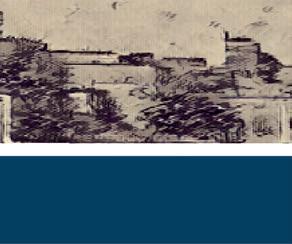
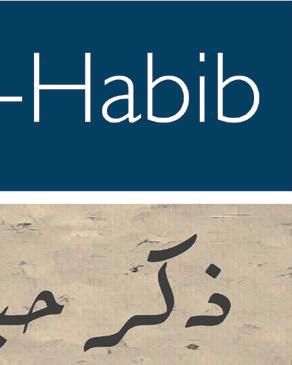
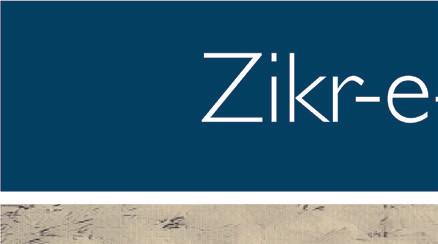
by no means less important. […] He also interviewed more than 60,000 persons, to whom he had to explain the teachings of Islam. He had also to play the host to all who visited him, for Islam inculcates the most cordial hospitality towards all guests. There were no hotels in Qadian where visitors could find board and lodging, nor were there any big shops or provision stores. Ahmadas had, therefore, to make all kinds of arrangements, and he always looked after his guests himself, even down to the minute details. He had to request his devoted friend at Jullundur, Ch. Rustam Ali, to buy for him and send ghee, vegetables, chutney, aerated waters, pan, etc. to Qadian.” (Life of Ahmadas, pp. 216-17)
Caring for all the requirements of his guests in showing hospitality, the Promised Messiahas said:
“I always give instructions to ensure that guests are provided with as much comfort as possible because I am very concerned that no guest should be inconvenienced. A guest’s heart is as fragile as glass and can be broken by the slightest knock. […] I grant permission to each and every person to present their problems and issues. There are some people who are not well, so foods for their special dietary needs can be prepared for them.” (Malfuzat [2003], Vol. 3, p. 292)
Hazrat Mirza Bashir Ahmad Sahibra MA states:
“The Promised Messiahas possessed a very hospitable nature, and those who would come to Qadian at the time of Jalsa or on any other occasion, whether they were Ahmadis or non-Ahmadis, benefited from his kindness and hospitality in every way. The Promised Messiahas would always pay special attention to their comfort and convenience. There was no pretentiousness in his nature and he used to welcome every guest as if they were his kinsfolk. The Promised Messiahas found heartfelt joy in serving and showing hospitality to his guests. Early companions relate that when a guest arrived, the Promised Messiahas would always meet him with a smile on his face. He would bless them with a handshake, ask for their well-being, and seat them with respect. If it was summer, the Promised Messiahas would make a sweet drink and serve it to them. If it was winter, he would get tea prepared and present it to the guests. The Promised Messiahas used to provide accommodation for the guests and would personally give instructions to the guest house staff regarding food, etc. He would advise them that there should not be any kind of inconvenience.” (Silsila Ahmadiyya, Vol. 1, p. 208)
Langar Khana
Under divine guidance that “People will

come to you by every distant track,” (Tadhkirah [English], p. 881), perceiving the rising number of guests visiting Qadian, the Promised Messiahas established a Langar Khana, or public kitchen, to take care of their needs and requirements.
This Langar Khana, which started in the house of the Promised Messiahas under the supervision of his devoted wife, Hazrat Syeda Nusrat Jehan Begumra, Amma Jan, kept serving and providing for the steadily growing number of guests throughout his life. The establishment of Langar Khana not only satisfied the needs of the guests but also manifested Prophet Ahmad’sas commitment to serving humanity and showing hospitality.
Regarding the administration of Langar Khana, Iain Adamson writes:
“[Prophet] Ahmad[as] kept the administration of the guest house and kitchen [Langar Khana] in his own hands, despite the fact that this was timeconsuming and inconvenient. When it was suggested that this could be done by an efficient administrator, Ahmad[as] declined. The guests were his personal responsibility, he said. He needed to look after them himself.” (Ahamd[as], The Guided One, p. 323)
Consequently, God Almighty blessed Langar the Khana manifold, and “as the community spread further throughout the
Friday 21 July 2023 | AL HAKAM 8
world, many of its missions also established their respective Langar Khana or Daruz-Ziafat, the three most well-established of them being in India, Pakistan and the United Kingdom. Moreover, temporary Langar Khanas are set up at large events such as Jalsa Salana, the annual gathering of the Ahmadiyya Muslim Community.” (AhmadiPedia, under the heading “Langar Khana”)
Third branch is hospitality
In his book, Victory of Islam, the Promised Messiahas declared hospitality of guests and visitors as the third branch in spreading and establishing Islam Ahmadiyyat. Highlighting the blessings of God Almighty in fulfilling the great hospitality of guests, Prophet Ahmadas said:
“A man of penetrating foresight would undoubtedly be baffled as to how all the necessities and particulars for the hospitality of such a vast number of people were capable of being satisfied over time and, going forward, what arrangement could sustain such a large operation.” (Victory of Islam, p. 22)
Swift, sufficient accommodation for guests
Hazrat Maulvi Abdul Karimra Sialkoti narrates:
“When the time came to build houses to meet the needs of guests, the Promised Messiahas emphasised again and again that, ‘It is useless to spend money on bricks and stone. Do what is sufficient to accommodate someone for a brief period.’
“The carpenter was cleaning wooden panels and boards with a planer, but the Promised Messiahas stopped him and said, ‘This is nothing but affectation. It is an unnecessary delay of time. Do what is necessary.’ The Promised Messiahas said, ‘Allah the Exalted knows that I have no love for any property. I consider my properties to be the shared possession of my friends, and I desire greatly that we all come together and spend some time with one another.’ The Promised Messiahas said:
“‘It would please me if there were a place where my friends occupied houses on all four sides and my house was situated in the middle, with an entrance leading to every home that surrounded my own, so that I could remain in constant contact and interaction with each and every one of them.’” (Life of the Promised Messiahas, pp. 63-4)
Hazrat Maulvi Abdul Karim Sialkotira said:
“Brothers! All of these words are true, and the events are a testament to this fact. The property, both inside and out, downstairs and on the upper level, is full of guests like a ship. The Promised Messiahas also has a portion for himself after the division of other areas. In reality, he himself lives in a very small portion of the house. He lives in his own house as one who stays in a temporary home for travellers; the traveller never entertains the thought that this is his own home.” (Ibid., p. 64)
Serving Jalsa guests
Hazrat Munshi Zafar Ahmad Sahibra narrates:
“Once, a great number of people who had come to attend the Jalsa Salana did not
have any bedding. A person named Nabi Bakhsh Numbardar of Batala started taking out quilts from inside and kept distributing them to the guests. I went to the Promised Messiahas after Isha prayer and he was sitting with his arms wrapped around himself [due to the cold], and his son, who was probably Hazrat Mirza Bashir-ud-Din Mahmud Ahmad[ra], was lying next to him. Prophet Ahmadas had covered him with a cloak. I realised that, upon request, the Promised Messiahas also sent his own bedding for the guests. I said to the Promised Messiahas, ‘You do not have a quilt and it is very cold out here.’ Prophet Ahmadas replied, ‘The guests should not be discomforted, and as far as my [comfort] is concerned, the night shall pass.’
“I came down and took Nabi Bakhsh to task, asking why he took the Promised Messiah’sas bedding. He was embarrassed and asked how he could take it back from the guest to whom he had given it. I then requested a quilt from Mufti Fazlur Rahman Sahib or someone else, probably someone else, and took it upstairs to Huzooras. Prophet Ahmadas said, ‘Give it to some other guest, I do not even sleep most of the night.’ Even on my insistence, the Promised Messiahas did not take it and asked me to give it to another guest, so I brought it back.” (Sirat-ul-Mahdi, Vol. 4, narration 1118)
people could eat at a time, which caused delays. Some guests retired to their rooms without eating. They received the reward that Allah the Almighty consoled with them and a revelation was conveyed directly by Allah to His apostle رتعملاو عئاجلا اومعطا (“Feed the hungry and the distressed”). When the Promised Messiahas enquired early in the morning, he found that some of the guests remained hungry. He called for the manager of the public kitchen (Langar Khana) and admonished him to take good care of the guests. (Tadhkirah [English], p. 988-989)
About the same revelation, Hazrat Dr Hashmatullah Khanra says:
“On the morning of 28 December 1907 at 8am after taking food, my humble self was absorbed in listening to the speeches. I also heard the speech of the Promised Messiahas and was greatly satiated. I offered Maghrib and Isha Prayers [combined] and, as directed, took my seat in Mubarak Mosque to participate in the general meeting of the Executive Board of Sadr Anjuman Ahmadiyya. I thought that I would eat after the meeting, because according to the announcement, the participation of the Presidents and Secretaries of the Jamaats was required. I was twenty years old, feeling weak and hungry, and had not eaten anything since 8am. I thought to myself that all members of the Anjuman must
someone knocked at the door and said, ‘Any guest who has not eaten can come to the public kitchen to eat.’ I went and gratefully ate what was available.
“Next morning at about 9-10am, I saw that the beloved Messiah[as] was standing at the door of Mubarak Mosque facing the street, and many of his devotees were present. He asked that Maulvi Sahib be called. So, Hazrat Maulvi Noor-ud-Deen presented himself. The Promised Messiahas said:
“‘It seems that the arrangements for food were not very satisfactory. The cry of some hungry one reached the Throne of Almighty Allah and I received the revelation, یبنلا اھیای رتعملاو عئاجلا اومعطا’ [i.e. ‘O Prophet, feed the hungry and the distressed.’]
“This revelation was received at 10pm. The Promised Messiahas called for the organisers and asked them to feed the guests who had not eaten. That is why one of them knocked at my door.” (Ashab-e-Ahmad, Vol. 8, pp. 91-2; Tadhkirah [English], p. 989)
Eating with guests
Stating how the Promised Messiahas strived to serve his guests, Iain Adamson says:
“[Prophet] Ahmad[as] also often ate with the guests to ensure that proper standards of cooking and service were maintained. He would actually eat only a little himself,
God informs the Messiahas to feed the hungry
In 1907, God Almighty sent the following revelation to the Promised Messiahas in the days of Jalsa Salana:
رتعملاو
“O Prophet, feed the hungry and the distressed.” (Tadhkirah [English], p. 988)
During Jalsa Salana Qadian in 1907, some guests were served meals very late. There was enough food, but because of the shortage of space, only a limited number of
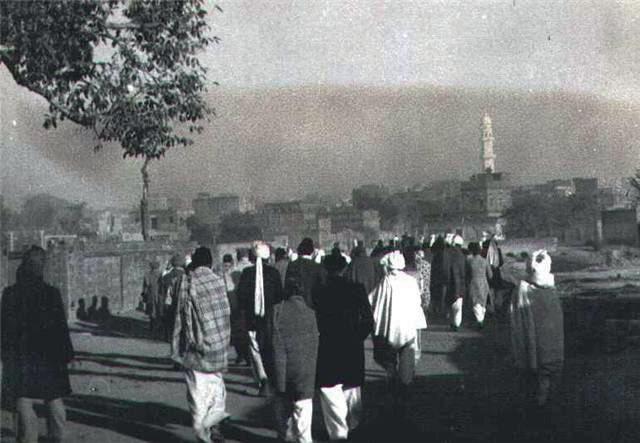
have gone to the public kitchen (Langar Khana) to eat and felt like doing the same. But I kept sitting out of fear that I might miss the meeting. I waited for two hours and felt the pangs of hunger. At 8:45 pm, the respected members of Anjuman and some others arrived, and the meeting started and was over at 11:45 pm. My desire for food vanished automatically since no strength to experience the feeling was left. I came out of the mosque and headed towards the public kitchen which was closed. I had no choice but to return to my residence at the Treasury. I was about to go to sleep when
An old view of Qadian | Image: library and instead busy himself bringing food and freshly baked bread to the guests. Then he would nibble at some bread, helping himself to small, fresh pieces in case a guest noticed that he had finished his meal and so be too embarrassed to continue eating.” (Ahmad[as], The Guided One, p. 230-31)
Presenting his own meal to guests
Hafiz Roshan Ali Sahibra related to Hazrat Mirza Bashir Ahmad Sahibra MA:
“Dr Mir Muhammad Ismail Sahibra
9 AL HAKAM | Friday 21 July 2023
عئاجلا اومعطا یبنلا اھیای
Continued on next page >>
narrated to me that once, on the occasion of a Jalsa, we were sitting in the company of the Promised Messiahas and pilau, zarda, etc., were being cooked outside for the guests. Meanwhile, a meal was served to the Promised Messiahas from inside [the house]. We thought it would be a splendid meal, but it only consisted of boiled rice and some dal, enough for a single person. The Promised Messiahas asked us to eat as well. So, we also joined him.” Hafiz Roshan Ali Sahibra said, “Dr Sahib told me that though there were a lot of men, everyone ate to their fill.” (Siratul-Mahdi, Vol. 1, narration 146)
Looking after the preferences of guests
In the Promised Messiah’sas biography, Iain Adamson writes:
“His [Prophet Ahmad’sas] hospitality became as well-known as his humility. When guests arrived, he always enquired about what kind of food they liked, what they did not like and any preferences regarding their sleeping arrangements. Once, some guests arrived and the porters, being busy, told them rather brusquely to unload their own luggage from their cart. The guests took offence, remounted their vehicle, and set off home again.
“[Prophet] Ahmad[as], when he heard what had happened, set off after them on foot. He caught up with them some five miles away. He apologised for the casual reception they had received and accompanied them back to Qadian, where he helped unload their luggage himself.
“Ahmad did not reprimand the servants directly. This was never his method. Some days later, however, in the mosque, he said they must all think more of the welcome they extended to people who came to Qadian.
When somebody had travelled many miles and suffered the hardships of the journey, it was a relief to arrive. If they were not met with a ready welcome, it was a great disappointment. Everyone should therefore strive to see that none of their guests was ever disappointed.” (Ahmad[as], The Guided One, pp. 229-30)
Abundance of guests and trust in God Almighty
During Jalsa Salana Qadian in 1903, a great number of guests arrived, exceeding prior expectations. Hazrat Mir Nasir Nawab Sahibra, who was the officer in charge of the Langar Khana at the time, came to the Promised Messiahas and said, “Huzooras, the guests have come in abundance; it seems that we will be unable to make ends meet.”
The blessed countenance of the Promised Messiahas flushed, and he got up immediately and said, “Mir Sahib, how could you say this? Don’t you know that a believer never goes broke? One who comes [to Jalsa Salana] brings their own fortune with them. And when one returns, they leave behind their blessings. How did you come to the conclusion that we would be unable to make ends meet? Please, never say this again.” (Sirat-ul-Mahdi, Vol. 5, narration 1288)
Humility and hospitality
Shedding light on the humble nature of the Promised Messiahas in serving his guests, Iain Adamson states:
“At dinner one evening, when his companions and guests were discussing their likes and dislikes regarding pickles, he suddenly got up and left the room. He returned with a bottle of the pickle that one person had said he was particularly fond of.
‘Why had he not asked a servant to fetch it?’, a guest asked. He was told that [Prophet] Ahmad[as] did not think he was superior
to anyone. He never acted like the master who only gave orders. When beds, chairs, or trunks had to be moved and Ahmad[as] happened to be passing, a servant would often find that Ahmad was on the other end of a bed.” (Ahmad[as], The Guided One, p. 228) He further states:
“[Prophet] Ahmad[as] never thought himself too grand for any task. One guest arrived well after midnight, when everyone was asleep. Ahmad[as] and a porter answered his knock. Ahmad[as] asked him to be seated, brought him a glass of milk and asked him to make himself comfortable while he and the porter arranged a bed. The guest waited a considerable time, and then, attracted by the sound of banging, followed the noise to its source.
“He found Ahmad[as] and the porter hurriedly banging together the framework for a charpoy. All the beds were occupied, and not wanting to disturb the people who normally looked after these arrangements, Ahmad[as] had told the porter they would make the bed themselves while the guest waited.” (Ibid., p. 228-9)
Praying and providing medicine
“One guest, a well-known religious leader, fell seriously ill and appeared to be at the point of death. At midnight, a companion went to [Prophet] Ahmad’s[as] house. It was in complete darkness. He went around the corner to where he knew Ahmad’s[as] bedroom was and called out. Ahmad[as] answered. When the companion told him how ill the religious leader was, Ahmad[as] prayed silently. Then he mixed some medicine for him and said, ‘Make him drink this. God will save him.’
“The next morning, the religious leader was on the road to recovery. ‘Prayer is the real weapon in the armoury of a believer,’ [Prophet] Ahmad[as] told the companion. ‘The medicine was only a palliative.’” (Ibid.,
p. 230)
Polite in welcoming and kind in saying goodbye
“He [Prophet Ahmadas] was equally polite and welcoming in the morning. Despite the hundreds of people who were now there, he was always the first to offer the Islamic greeting, ‘Peace be with you.’ When a guest left, Ahmad[as] parted from him as though a very dear relative was leaving. He made a point of being there to say goodbye and would ask them to be sure to come again.”
(Ibid., p. 231)
Meeting the demands of guests
“Some of them [guests] made unexpected demands. [Prophet] Ahmad[as] had a smallsize Quran of which he was very fond. One guest said he would like to have it as a memento of Ahmad[as]. [Prophet] Ahmad[as] immediately handed it over. When he was asked why he had done so, he said, ‘I liked it very much, but I thought of the verse of the Holy Quran which says: Ammas-saa-ila falaa tanhar [i.e. ‘And chide not him who asks’]. I, therefore, gave him the Quran.’” (Ibid.)
Conclusion
The example of profound hospitality set by the Promised Messiahas continues to encourage his followers to carry on his legacy. Under the guidance of Prophet Ahmad’sas present successor, Hazrat Mirza Masroor Ahmad, Khalifatul Masih Vaa, members of the Ahmadiyya Jamaat are inspiring many to take part in this blessed deed of looking after each other and selflessly serving humanity. Whether it is during Jalsa Salana or everyday interactions, followers of the Promised Messiahas strive hard to establish an atmosphere of sharing, caring, and showing hospitality.

Friday 21 July 2023 | AL HAKAM 10
“An additional benefit of these gatherings will be that each year new entrants to the Jamaat shall, by being present on the fixed dates, get to know their brethren who had joined earlier. And these meetings will lead to progressive strengthening of the bond of mutual love and affection.”
(The Promised Messiahas, The Heavenly Decree)
<< Continued from previous page
BBC presenter and armchair detectives
Islamic viewpoint on scandal and speculation
Romaan Basit Ahmadiyya Archive and Research Centre
The BBC presenter who has recently dominated the headlines due to his involvement in paying a teen for sexually explicit photographs has now been named. Although his identity was concealed whilst the investigation was underway, social media and gossip-filled news outlets immediately sprang to life and were rife with speculation.

The natural infuriation of the public isn’t much of a surprise, especially after the similar stories of Jimmy Saville and Phillip Schofield. This said, the open and free-forall social media trial resulted in a number of well-known presenters being wrongfully blamed and accused in the process, causing them to face severe backlash.

Was it really a good idea to play the blame game and go investigating, even though the police and authorities were involved?
A myriad of tweets began to emerge over the weekend, attempting to guess the name of the presenter. In a ‘straw poll’ carried out by the Daily Mail, 49 out of 291 people approached in towns and cities around the country ‘correctly identified’ the presenter, meaning over 80% guessed wrong. (www. theguardian.com/commentisfree/2023/ jul/11/bbc-presenter-story-tabloids-sun ) Even betting shops openly offered odds on who the man was. Piers Morgan highlighted how “presenters like Gary Lineker, Rylan Clark and Jeremy Vine have all been disgracefully smeared and defamed by armchair detectives who don’t understand the devastating impact it has.” Jeremy Vine, one of the BBC’s highest-profile presenters and among the wrongfully accused, publicly appealed for the man to come forward himself to put an end to all the detrimental speculation.
There is no doubt that the actions of the individual were categorically wrong. However, the point is that instead of suddenly becoming armchair detectives and
speculating, blaming and falsely accusing whilst the investigation was underway, it would have been better for people to leave the investigation to the rightful authorities.
Avoid suspicion, spying and slander: A Quranic teaching
As Muslims, we believe that the Holy Quran can be turned to for guidance in every single situation. No matter how contemporary an issue may seem, a Quranic solution can always be found. In the past couple of days, many innocent people have been wrongfully accused, creating a shadow of negativity around them and causing the public to think ill of them. Consequently, they have had to issue public statements denying all the false accusations.
To avoid all this in society, the Holy Quran teaches us to “avoid most of suspicions; for suspicion in some cases is a sin”. (Surah al-Hujurat, Ch.49: V.13). We are then instructed to “spy not, nor back-bite one another.”
Isn’t this exactly what we have witnessed in the last few days? In the commentary, it has been explained that this verse contains “some of those social evils that cause discord, dissensions and differences, and corrode, corrupt and contaminate a society”, and that Muslims have been enjoined “to be on guard against them” at all times. It continues to state that “by removing the basic causes of disharmony and disagreement […], the Surah has laid the foundation of a firm and solid brotherhood”. (Five Volume Commentary, Volume 5, p. 2963). By eliminating such vices, a harmonious society can be established.
True believers shun all that which is vain
Also, by heavily discussing such scandals, be it online or with our peers, we play a vital role in further spreading such immorality and indecency. This is detrimental to society.
The Holy Quran teaches us that a key characteristic of true, righteous believers is that they “shun all that which is vain”. (Surah al-Mu’minun, Ch.23: V.4)
The Five Volume Commentary of the Holy Quran – inspired by the commentary of Hazrat Khalifatul Masih IIra – states that “the second stage in the spiritual journey of man consists of the avoidance of all vain talk and thoughts.” A true believer “shuns all vain and useless pursuits which are incapable of doing any good either to his own person or to his community or country”. (Five Volume Commentary, Vol. 4, p. 2186).
If we take a step back and think, what benefit was derived from all this speculation? The only outcome was negativity. The Holy Prophetsa taught us to either speak a good word or remain silent. (Sahih al-Bukhari, Kitab al-adab, Hadith 6136) Similarly, in another hadith, we are taught that when we see something wrong, we must only intervene and stop it physically if we have the power to do so. If not, we should speak out against it, but only if this too can bring about a change. If not, then all we can do is deem it wrong in our hearts. (Sahih Muslim, Kitab-ul-Iman, Hadith no. 84) In this situation, we did not have the power to physically change the situation, nor would speaking out have any effect. The authorities were investigating the matter, dealing with evidence that was not available to the public; hence, it would have been wiser to wait for the identity to organically be revealed.
Why was the identity kept a secret?
As for why the identity was concealed and not revealed earlier, it is important to note that severe legal problems can arise due to a lack of reportable evidence. The law of defamation protects the reputation of
any individual from the massive harm that can potentially be caused by lies (we have witnessed so many cases of people being wrongly accused). This law protects anyone, whether it be a high-profile BBC presenter or an entirely private individual.
Dominic Casciani, home and legal correspondent of the BBC, wrote that “anyone speculating today on social media about the identity of the presenter should think very, very carefully about the consequences. They could be sued for the harm they cause and find themselves financially ruined.” Also, since a Supreme Court ruling in 2022, a right to privacy covers people who are under investigation by a law enforcement agency, which is the stage before they have been formally charged with a crime and sent to court. (www.bbc. co.uk/news/entertainment-arts-66148321) There are also privacy issues that may not carry any legal repercussions as such, but are ethically totally unacceptable; for example, the impact all this could have on the families and loved ones of all those involved. The Holy Quran tells us many times that “no soul will bear the burden of another soul”. (Surah Fatir, Ch.35: V.19). Why should entire families have to suffer for the mistakes of a single individual? The wife, children and loved ones of the presenter have done nothing wrong, yet they are having to bear the heavy consequences and burden of this social media trial. Is this really just and fair?
Say a good word or remain silent
The moral of the story is that speculation in the public sphere, while seemingly harmless, can inflict significant harm on innocent individuals. We have seen how innocent presenters were viciously accused and forced to defend themselves in the face of severe backlash. In the future, let’s leave the investigating to the investigators, and either say a good word or remain silent.
11 AL HAKAM | Friday 21 July 2023
dole777 | Unsplash
K. Mitch Hodge | Unsplash
As you delve into Jamaat literature, you are likely to encounter the awe-inspiring narrative of a humble village, nestled within the Punjab, gaining global acclaim. We, at the Ahmadiyya Archive and Research Centre (ARC), believe in the power of historical narratives and their living resonance. That is why we aim to offer our visitors the opportunity to take a tangible piece of history home with them.








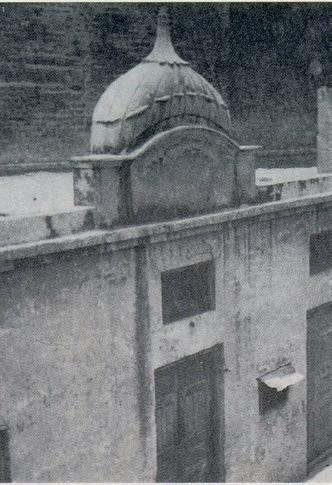
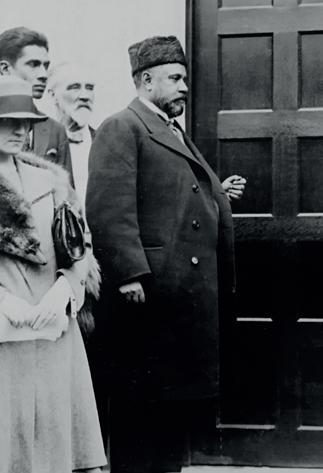


Embark on a journey through time. For this, we have meticulously selected a series of historical newspapers, books, manuscripts, rare pictures, maps and much more. Yet, this is merely a glimpse of the vast collection at our disposal.
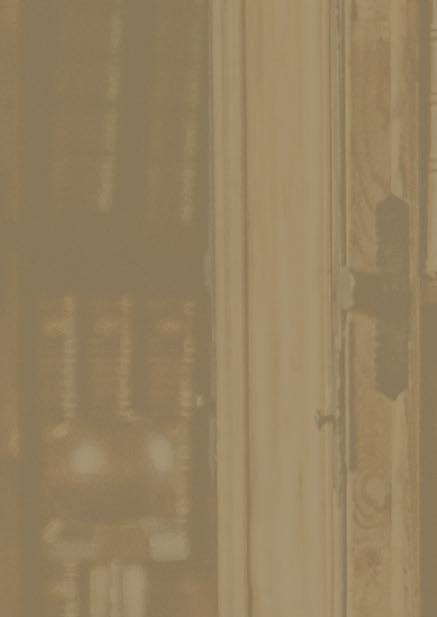

Friday 21 July 2023 | AL HAKAM 12 <<<<<<<<<<<<<<<<<<<<<<<<<<<<<<<<<<<<<<<<<<<<<<<<<<<<<<<<<<<<<<<<<<<<<<<<<<<<<<<<<<<<<<<<<<<<<<<<<<<<<<<<<<<<<<<<<<<<<<<<<<<<<<< <<<<<<<<<<<<<<<<<<<<<<<<<<<<<<<<<<<<<<<<<<<<<<<<<<<<<<<<<<<<<<<<<<<<<<<<<<<<<<<<<<<<<<<<<<<<<<<<<<<<<<<<<<<<<<<<<<<<<<<<<<<<<<<
28-30 July 2023
Jalsa Salana UK
AARC Museum
Tracing
the Past
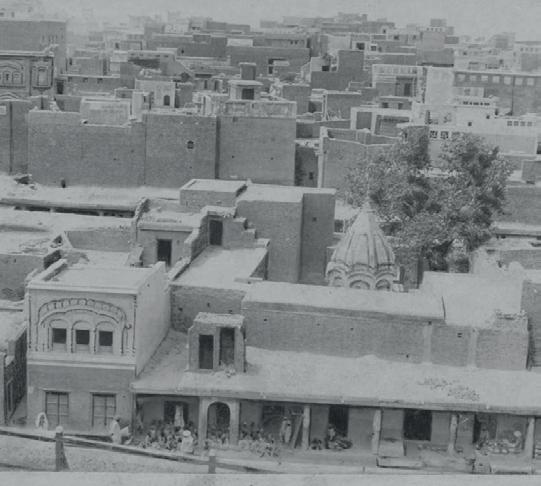

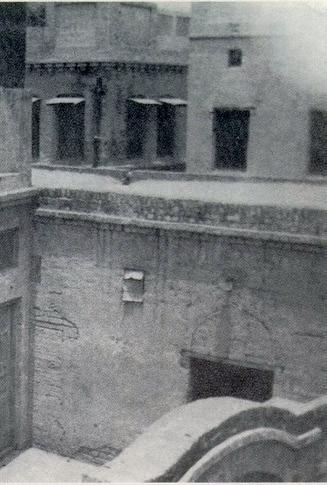


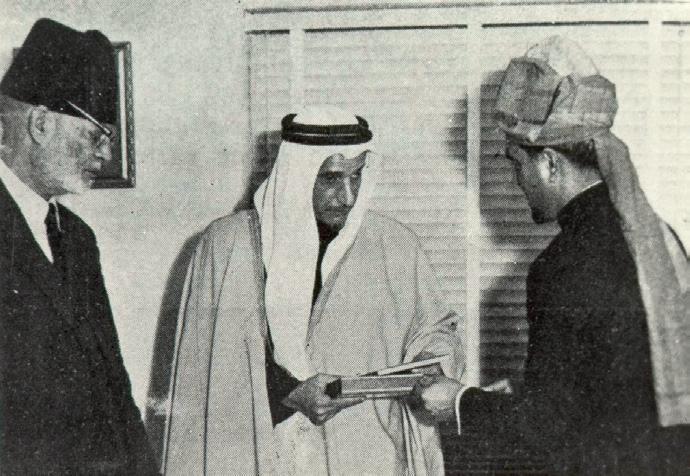


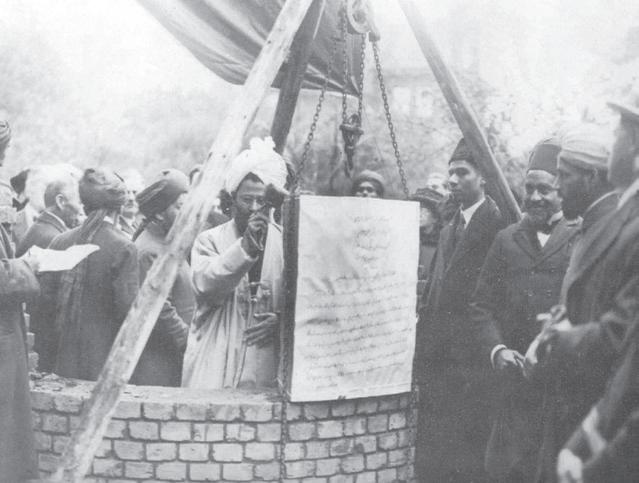
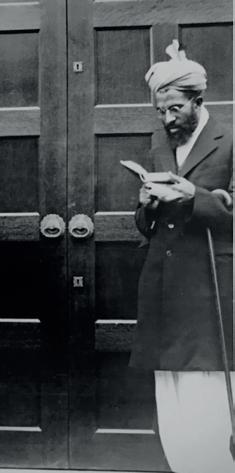


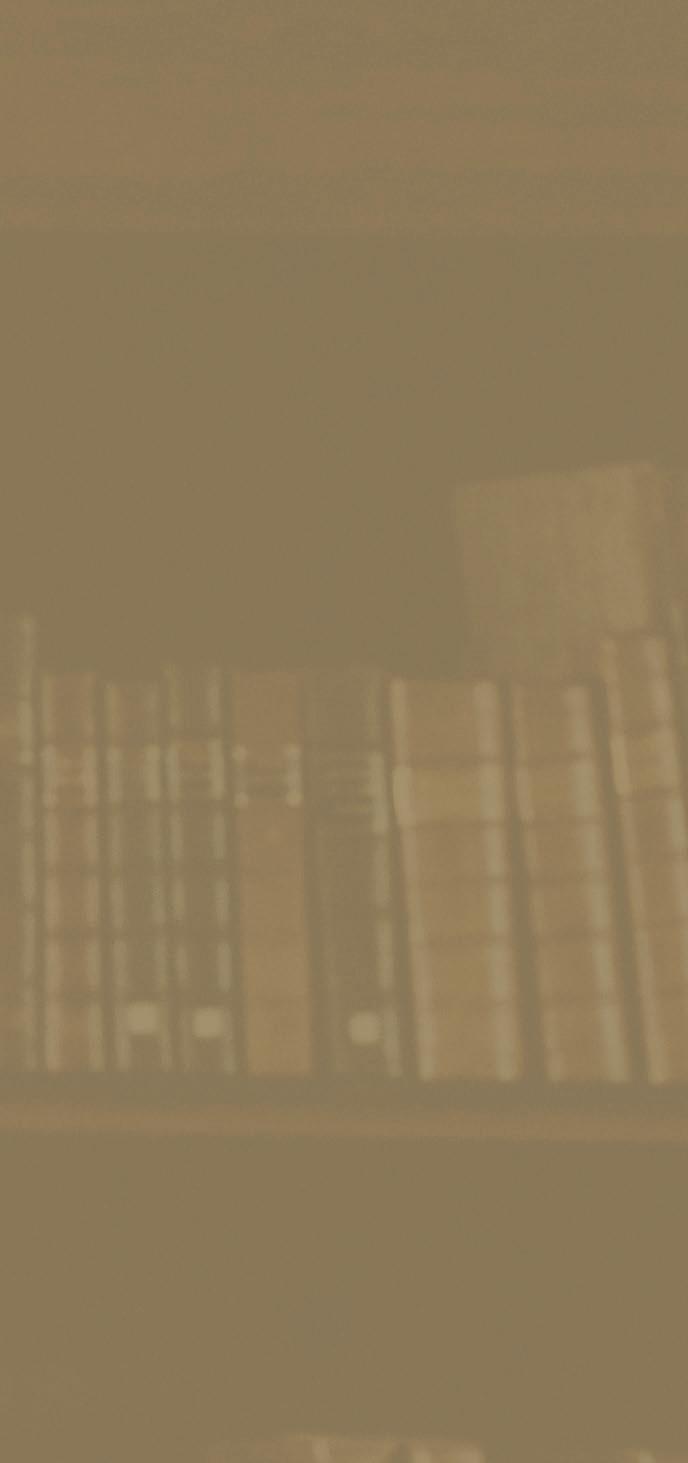
<<<<<<<<<<<<<<<<<<<<<<<<<<<<<<<<<<<<<<<<<<<<<<<<<<<<<<<<<<<<<<<<<<<<<<<<<<<<<<<<<<<<<<<<<<<<<<<<<<<<<<<<<<<<<<<<<<<<<<<<<<<<<<<<<<<<<<<<<<<<<<<<<<<
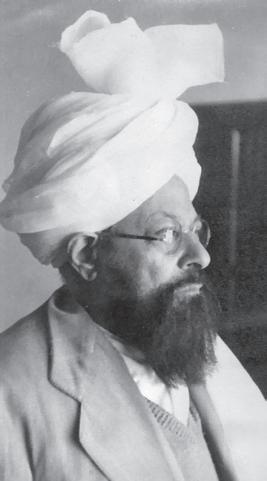

A Journey Through Time <<<<<<<<<<<<<<<<<<<<<<<<<<<<<<<<<<<<<<<<<<<<<<<<<<<<<<<<<<<<<<<<<<<<<<<<<<<<<<<<<<<<<<<<<<<<<<<<<<<<<<<<<<<<<<<<<<<<<<<<<<<<<<<<<<<<<<<<<<<<<<<<<<<

13 AL HAKAM | Friday 21 July 2023
Poetic expression of the Holy Prophet and his companions
Athar Ahmad
Student Jamia Ahmadiyya UK
A common criticism levelled against the Promised Messiahas is related to his writing of poetry, which some of his opponents argue disqualifies him from prophethood. However, this perspective overlooks the fact that even our beloved master, the Holy Prophet Muhammadsa expressed himself in poetic verse on certain occasions.
In the time of the Holy Prophet Muhammadsa, and indeed even before his advent, Arabian society demonstrated a deep affinity for poetry. It was a vital channel for expressing thoughts and emotions.

Hence, it has been narrated that the Holy Prophetsa said:
“In some poetry, there is wisdom.” (Sahih al-Bukhari, Kitab al-adab, Hadith 6145)
Poetry has long been celebrated as a form of artistic expression that captures the beauty of language and emotions. Authentic narrations indicate that the Holy Prophetsa enjoyed certain forms of poetry, specifically those that praised Allah the Almighty or reminded people of the life of the afterlife.
Hence, ‘Amr ibn ash-Sharid reported that his father said:
“As I rode behind the Prophetsa, I recited to him a hundred poetic verses, composed by Umayya ibn Abi as-Salt. Whenever I recited a verse to him, the Prophetsa said to me: “Recite more” until I had recited a hundred to him.” The Prophetsa then said: ‘He was surely near to embracing Islam!’” (Sahih Muslim, Kitab ash-shi‘r)
Many of the companions of the Holy Prophetsa possessed a remarkable talent for poetry. They would recite eloquent verses that captured the essence of their faith and their deep admiration for the Holy Prophetsa. Their poetic expressions not only served as a form of artistic expression, but in reality, they were a means to convey their love, respect, and unwavering loyalty to the Holy Prophetsa and the teachings of Islam. Their poetry continues to inspire and uplift believers to this day, showing the love, loyalty and obedience of the early companions towards Islam and its Messengersa
This article will explore a selection of these eloquent verses, delving into their profound beauty and significance.
Exemplifying sacrifice and unwavering commitment in the path of Allah
It is narrated by Jundab bin Sufyanra that in one of the battles, a finger of Allah’s Messengersa was wounded and began to bleed. Upon this, he said:
“You are just a finger that has been injured and suffered in the way of Allah.”
(Sahih al-Bukhari, Kitab al-jihadi was siyar, Hadith 2802)
This couplet reflects the Holy Prophet’ssa understanding of the significance and purpose of his mission, which was to spread the message of Islam. The Prophetsa recognised that his personal sacrifices, including physical pain or injury, were part of the greater cause of propagating the message of Allah and upholding His guidance.
By referring to his bleeding finger as being “in Allah’s cause,” the Prophetsa emphasised the importance of remaining steadfast and resolute in the face of hardships and sacrifices for the sake of Allah. He demonstrated that personal suffering and injuries endured in the pursuit of righteousness and the fulfilment of one’s responsibilities should be borne with patience and perseverance.
Immense bravery of the Holy Prophetsa at the battle of Hunayn
Abu ‘Ishaq narrated that a man asked AlBara: “O Abu ‘Umara! Did you flee on the day (of the battle) of Hunayn?” Al-Bara replied, while I was listening, “As for Allah’s Messengersa, he did not flee on that day. Abu Sufyan bin Al- Harith was holding the reins of his mule and when the pagans attacked him, he dismounted and started saying,
status to the enemy – most of whom did not even recognise him – by reciting the couplet mentioned above in the hadith.
Martyrdom of Hazrat Khubaibra bin ‘Adiyyra
Hazrat Abu Hurairara narrated: Allah’s Messengersa sent ten people to bring the enemy’s secrets, and Khubaib AlAnsari was one of them. Ubaidullah bin Iyad told me that the daughter of Al-Harith told him that when they gathered (to kill Khubaib Al-Ansari) [...], he said in verse:
inspire and motivate Muslims to stand firm in their faith, even in the most challenging of circumstances.
The demise of the Holy Prophetsa
One of the greatest Arab poets was Hazrat Hassan bin Sabitra, a companion of the Holy Prophetsa who used poetry as a powerful medium to praise the Holy Prophetsa and defend Islam. With his poetic skills and unwavering devotion, Hazrat Hassan bin Sabitra left a lasting legacy as one of the most prominent poets of Islam.
The status of Hazrat Hassan bin Sabitra can be understood from the following narration. It was narrated by Hazrat Aishara that:
“When I am being martyred in the cause of Islam as a Muslim, I care not as to which flank I fall upon after being martyred; all of this is for the sake of God; And if my God so wills, He shall bless my every severed limb.”
Then Ibn Al-Harith killed him, and The Messengersa of Allah informed his companions of the deaths of those (ten men) on the very day they were killed. (Sahih alBukhari, Kitab at-tawhid, Hadith 7402)
“Allah’s Messengersa used to set up a pulpit in the mosque for Hassan. He would stand upright upon it, paying tribute to Allah’s Messengersa” – or she said – “to defend Allah’s Messengersa. And Allah’s Messengersa said: ‘Indeed Allah has aided Hassan with the Spirit of Holiness when he defends or pays tribute to Allah’s Messenger.” (Jami‘ at-Tirmidhi, Kitab al-adab ‘an rasulullahsa, 2846)
“I am a prophet. I am not a liar. I am the son of Abdul Muttalib.” On that day, nobody was seen as braver than the Prophet. (Sahih al-Bukhari, Kitab al-Maghazi, Hadith 3042) Hazrat Musleh-e-Maudra, writes about this couplet:
“The Holy Prophetsa said that
When Hazrat Khubaib bin ‘Adiyyra got captured in the incident of Raji‘, the chieftains of Quraish, out of sheer enmity, couldn’t resist but execute to Hazrat Khubaibra. The people of Banu Al-Harith took him to an open field to execute him. The standards of love and devotion of Hazrat Khubaibra were of such magnitude, that prior to his martyrdom, he articulated his sole wish as the opportunity to engage in voluntary prayers before his Creator. Hazrat Khubaibra offered two rak‘at of salat, with the permission of Quraish, in front of them, and then fearlessly leaned forward, reciting the couplets mentioned above in the hadith.
The martyrdom of Hazrat Khubaibra is a powerful reminder of the resilience and unwavering commitment of believers in the face of adversity. His example continues to
Hazrat Hassanra said many famous and magnificent couplets. But the couplets he said at the demise of the Holy Prophetsa are full of admiration, affection and devotion, which wonderfully depict his and the companions’ feelings for the Holy Prophetsa
The Promised Messiahas also greatly loved these couplets of Hazrat Hassanra. As it is mentioned:
“Once, the Promised Messiahas was walking alone in the mosque in the neighbourhood of his house, known as Masjid Mubarak, and was humming something. Tears flowed from his eyes. A sincere friend came from outside and heard that he was reciting the couplet of Hazrat Hassan bin Thabitra, which he had written on the demise of the Holy Prophetsa:
Continued on next page >>
“That is to say that I am the Promised Prophetsa whose protection is eternally promised. I am not a liar. That is why I do not care if you are three thousand archers or thirty thousand. And O polytheists! Seeing this boldness of mine, do not mistake me for God, I am a human being, and I am the grandson of your chief Abdul Muttalib.”
(Tafsir-e-KabIr, Vol. 6, p. 409)
This couplet showcases the immense bravery and courage of the Holy Prophetsa When on the occasion of the battle of Hunayn, the enemy unexpectedly attacked in the narrow valley of Hunayn. The Holy Prophetsa not only moved forward with great courage and bravery in the face of the enemy’s invasion and barrage of arrows, but also identified himself and announced his
Friday 21 July 2023 | AL HAKAM 14
ةمكح رعشلا نم نإ
تيمد عبصإ الإ تنأ له تيقل ام هللا ليبس يفو
بذك ال يبنلا انأ بلطملا دبع نبا انأ
بذك ال يبنلا انأ بلطملا دبع نبا انأ
يعرصم هلل ناك قش يأ یلع * املسم لتقأ نيح يلابأ تسلو عزمم ولش لاصوأ یلع كرابی * أشی نإو هلإلا تاذ ي كِلذو
Ryan Pradipta Putra | Unsplash
Jalsa Salana: A unifying platform in face of challenges of modernity
Ifekhar Ahmed Ahmadiyya Archive & Research Centre
Introduction
The human being is widely regarded as a zoon politikon – a social being – embodying a nature that thrives in communal interactions. This assertion contains a variety of implications; however, of particular interest to us in this context is how Islamic teachings, with their emphasis on unity and harmony, have ingeniously adapted to various social arrangements, especially in tandem with the realm of worship. Through these elaborate arrangements, Muslims come together not only to perform their religious duties, but also to draw moral and spiritual strength, engage in meaningful discussions about current issues, align their personal and communal goals that require social interactions, and develop strategies together to cope with life’s difficulties.
Structures of gathering
At the neighbourhood level, Muslims are called upon to participate in the five daily obligatory prayers in their local mosques, which promotes a sense of belonging and the fulfilment of religious duties at this local level. In addition, the weekly Friday prayer brings people together at the main mosque and unites them at a larger city, district, or county level. The twice-yearly Eid prayers represent an even larger and wider gathering that involves an even more diverse community. Finally, ‘umrah, the minor pilgrimage, which one may participate in several times in a lifetime, and, hajj, the major pilgrimage, which is an
<< Continued from previous page
“O my Prophetsa! You were the pupil of my eye. So, my eyes are now blind after your death; now, whoever dies after you may die. For I only feared your death.”
The narrator states that when I saw the Promised Messiahas weeping like this and walking alone in the mosque, I got worried and asked what the matter was and what shock Huzooras had received. The Promised Messiahas said, “I was reciting this couplet of Hassan bin Thabitra at that time, and I wished that I had been the one who [originally] recited this couplet.” (Seerat-eTayyibah, by Hazrat Mirza Bashir Ahmadra, pp. 27-28)
In conclusion, the faith-inspiring couplets of the Holy Prophetsa and his companionsra stand as timeless reminders of their unwavering commitment to Islam and their profound connection with Allah.
essential religious duty once in a lifetime if one is able to, witness an unprecedented gathering that reinforces community.
Jalsa Salana and its legitimacy
Considering Islam’s claim of perfection in all respects for all times and places and the aforementioned arrangements it has bestowed upon us, one might wonder about the existence and raison d’être of the Jalsa Salana. However, as the sands of time flow inexorably, each age presents its own challenges and demands. Therefore, interpretations and organisational structures pertaining to these arrangements have always naturally evolved throughout history. The present age is no exception. Under the enlightened guidance of the Imam of our time, the Promised Messiahas and Just Arbiter foretold by the Messengersa of Allah, these arrangements, which are based on the core principles of the Quran and the sunnah, persist unchanged in their entirety, and, only where applicable, are adeptly adjusted through legal reasoning (ijtihad) to align with the contemporary context.
The advent of global modernity coincided with the collapse of Muslim empires and the rise of nation-states, necessitating the establishment of a new type of gathering at yet another level, viz., the national level, to address the challenges of this era. To fill this gap, the Promised Messiahas, inspired by Allah Almighty, introduced the Jalsa Salana.
Against this background, the legitimacy of the Jalsa Salana can be firmly established within the framework of Islamic jurisprudence, based on at least two fundamental maxims of Islamic legal theory. The first maxim states:
“What is a sine qua non for the fulfilment of an obligation is itself an obligation.”
This means that something that is absolutely necessary for fulfilling a religious duty becomes a duty itself, i.e., if there is a requirement or condition that must be met to properly carry out an obligation, fulfilling that requirement also becomes obligatory. Thus, the objectives behind the appearance of the Promised Messiahas and the establishment of the Ahmadiyya Muslim Jamaat undeniably make the organisation of the Jalsa Salana an imperative obligation.
For those who may perceive this as an arbitrary extension of Islamic law, a second maxim provides valuable guidance, stating:
“There is no denying that legal rulings change with the changing times.”
Indeed, the current age of modernity is very different from all previous eras and requires adjustments to meet the unique challenges and complexities that arise.
Resisting the lure of modernity and the Antichrist
Our current era is characterised by its lack of precedent, necessitating measures without precedent. In view of the present times, the Messengersa of Allah prophesied that, at the time of the Second Coming of Jesusas:
“Eventually, even a single prostration will be better than the whole world and all that is in it”. (Sahih al-Bukhari)
He also said:
“From the creation of Adam until the Hour is established, there is no greater tribulation than the tribulation of the Antichrist.” (Musnad Ahmad)
Thus, we find ourselves in an age of unparalleled trials and tribulations, which have currently culminated in the return of Jesusas and the ongoing final battle between the forces of good and evil, the battle against ad-dajjal – the Antichrist.
The characteristic features of our unprecedented era, which is dissimilar to all previous epochs, can be gleaned, besides the first ten, from the last ten verses of the eighteenth chapter of the Holy Quran, Surat al-Kahf. The recitation or memorisation of these verses offers, as declared by Allah’s Messengersa, protection from the Antichrist. (Sahih Muslim)
In Islamic teachings, the Antichrist embodies a latter-day phenomenon of great deception and perversion that will seek to lead people astray from the path of righteousness. The challenges of modernity have striking parallels with the characteristics associated with the Antichrist in the last ten verses of Surat al-Kahf. The increasing prevalence of godlessness and moral decay in today’s world is consistent with the spirit of the Antichrist and leads to a sense of nihilism where the meaning and purpose of life are questioned.
Modernity has ushered in an era of individualism and radical autonomy, leading to a dwindling influence of moral authorities and institutions. In times past,
Continued on page 17 >>
Bangla Department of Jamaat-e-Ahmadiyya UK holds a get-together

Mansoor Ahmad Secretary Bangla Department, UK
A get-together of the Bangla Department of Jamaat-e-Ahmadiyya UK was held on 17 June 2023 at the Baitul Futuh Mosque, London, presided over by Dr Abdullah Zakaria Sahib, President of the Bangla Department UK.
The event started with the recitation from the Holy Quran with Bengali and English translations, followed by a hadith, extracts from the writings of the Promised Messiahas, and a Bengali poem.
After this, Muhammad Abdul Hadi Sahib, Convener South Region, spoke on the
formation, beliefs, and worldwide progress of Ahmadiyyat.
Dr Abdullah Zakaria Sahib conducted the interactive session. An engaging question and answer session took place where several non-Ahmadi guests asked various questions about the truthfulness of the Promised Messiahas and the death of Jesusas. Feroz Alam Sahib, Ahmad Tareque Mubasher Sahib, and Dr Abdullah Zakaria Sahib gave the answers and extended invitations to the guests to attend the followup session in the near future.
A beautiful Quran exhibition showing translations of the Holy Quran in various languages was arranged along with other
literature.
The event was followed by mosque tours and refreshments. Around 140 participants, including 21 guests, attended the event.
15 AL HAKAM | Friday 21 July 2023
بجاو
وھف هب الإ بجاولا متی ال ام
نامزألا ريغتب ماكحألا ريغت ركنی ال
اھيف امو ايندلا نم ريخ ةدحاولا ةدجسلا نوكت یتح
ةنتف نم ربكأ ةنتف ةعاسلا موقت نأ یلإ مدآ قلخ نيب ام لاجدلا
رظانلا یلع یمعف یرظانِل داوسلا تنك رذاحا تنك كيلعف تميلف كدعب ءآش نم
Photo courtesy Bangla Department, UK
First-ever international conference of Ahmadiyya missionaries, London, 1955
Ata-ul-Haye Nasir
Al Hakam
On 22-24 July 1955, the first-ever international conference of the Ahmadi missionaries was held in London, which was presided over by Hazrat Musleh-e-Maud, Mirza Bashir-ud-Din Mahmud Ahmadra
Mentioning this conference, The Civil and Military Gazette wrote:
“Conference of Muslim Mission of Europe and America Begins
“London, July 22 – A conference of the Muslim Mission of Europe and America to discuss ‘the propagation of Islam in the world’ begins in London today.
“A representative of the London Mosque said last night, ‘The conference will examine the progress so far achieved in their missionary work and will plan new schemes for expansive dispensation of Islam in the West.’
“Delegates from the United States, Switzerland, Holland, Germany, W. Africa, and Trinidad have already arrived.
“Mr Mohammed Zafrullah Khan, Judge of the International Court of Justice, will attend by special invitation and the Head of the Ahmadiya Movement, Mirza Mahmud Ahmad is expected to address the conference which will last for three days. –Reuters.” (The Civil and Military Gazette, 23 July 1955, p. 6)
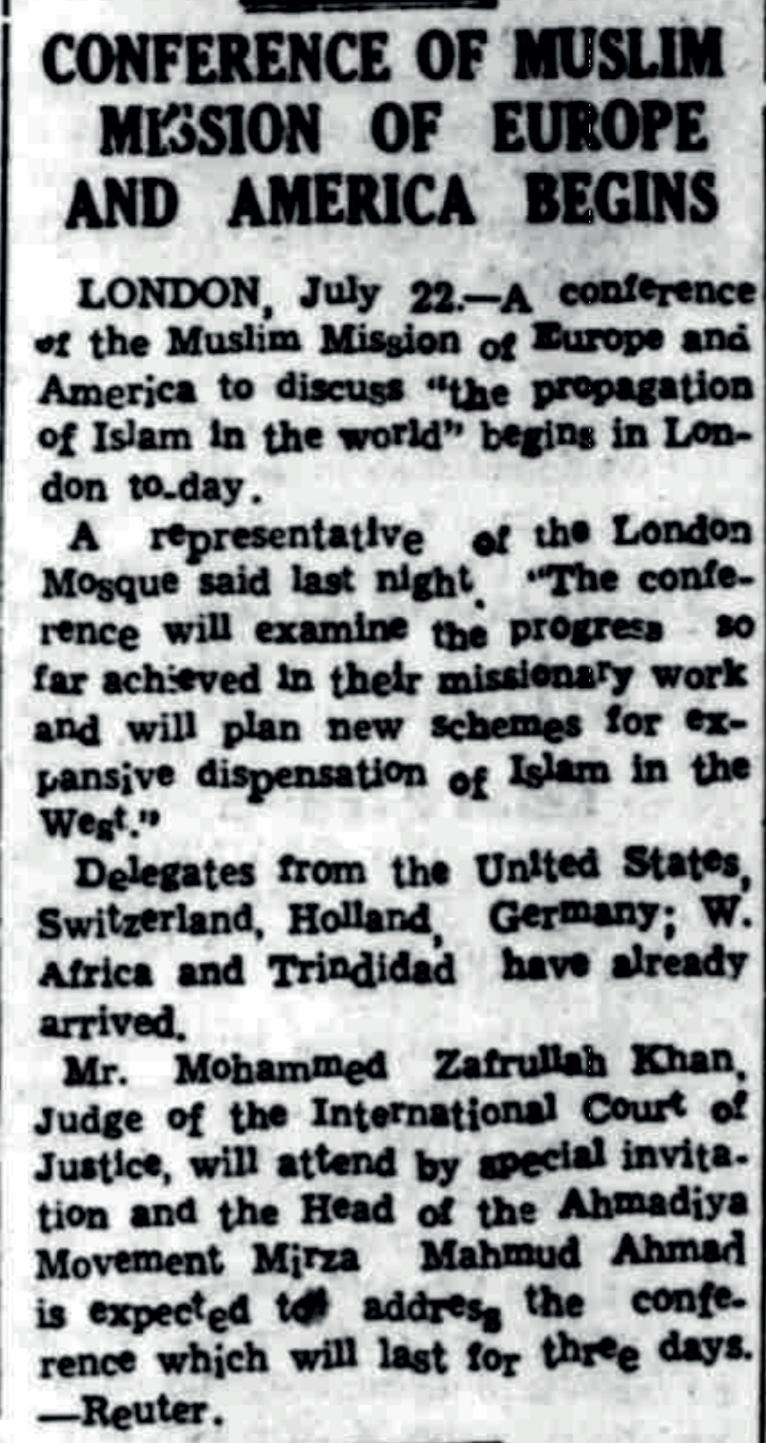
Hazrat Musleh-e-Maudra expressed his intention to hold such a conference while he was in Zurich in June 1955. Thus, an agenda of the conference along with a questionnaire was sent to the missionaries serving in Europe, America, and Nigeria,
and they were advised to consult with the other missionaries and members and then prepare a scheme before coming to the conference. (Al Fazl, 14 October 1955, p. 3)
On 21 July 1955, Huzoorra sent a telegram in which he conveyed a special English message to the members of the Jamaat. Al Fazl published its Urdu translation on 24 July 1955. In this message, Huzoorra stated that since the era of the Holy Prophet’ssa Companionsra, this would be the first occasion of its kind that a great conference would be held in London to ponder over the proposals for the propagation of Islam to all corners of the world. The conference would comprise the Ahmadi missionaries who are serving in the major countries of America, the West Indies, Africa, and Europe. Sir Zafrulla Khan Sahibra will also attend the event on 22 July. In the end, Huzoorra called the attention of all Ahmadis to pray for the success and fruitful results of this blessed event. (Al Fazl, 24 July 1955, p. 1)
The conference took place at the mission house at 63 Melrose Road, London. The proceedings continued for three days and included group consultations under subcommittees. The conference consisted of five sessions, which were all graced with the presence of Hazrat Musleh-e-Maudra. A steering committee was formed to run the proceedings of the Conference, including Sahibzada Mirza Mubarak Ahmad Sahib, Khalil Ahmad Nasir Sahib, Naseem Saifi Sahib, and Sheikh Nasir Ahmad Sahib. (Al Fazl, 6 August 1955, p. 3)
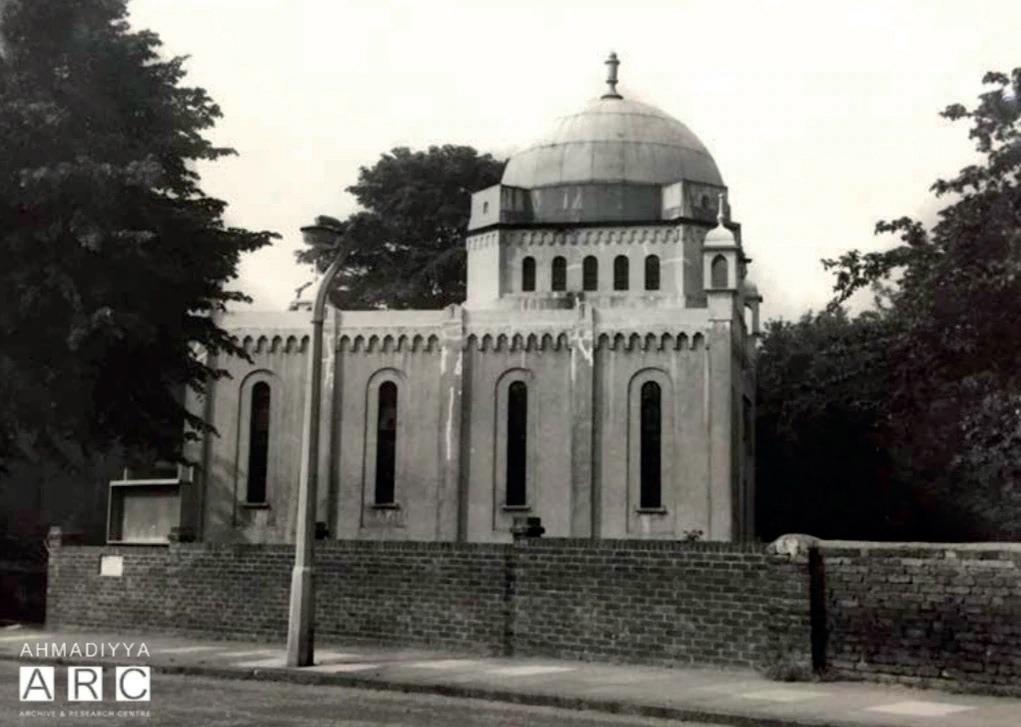
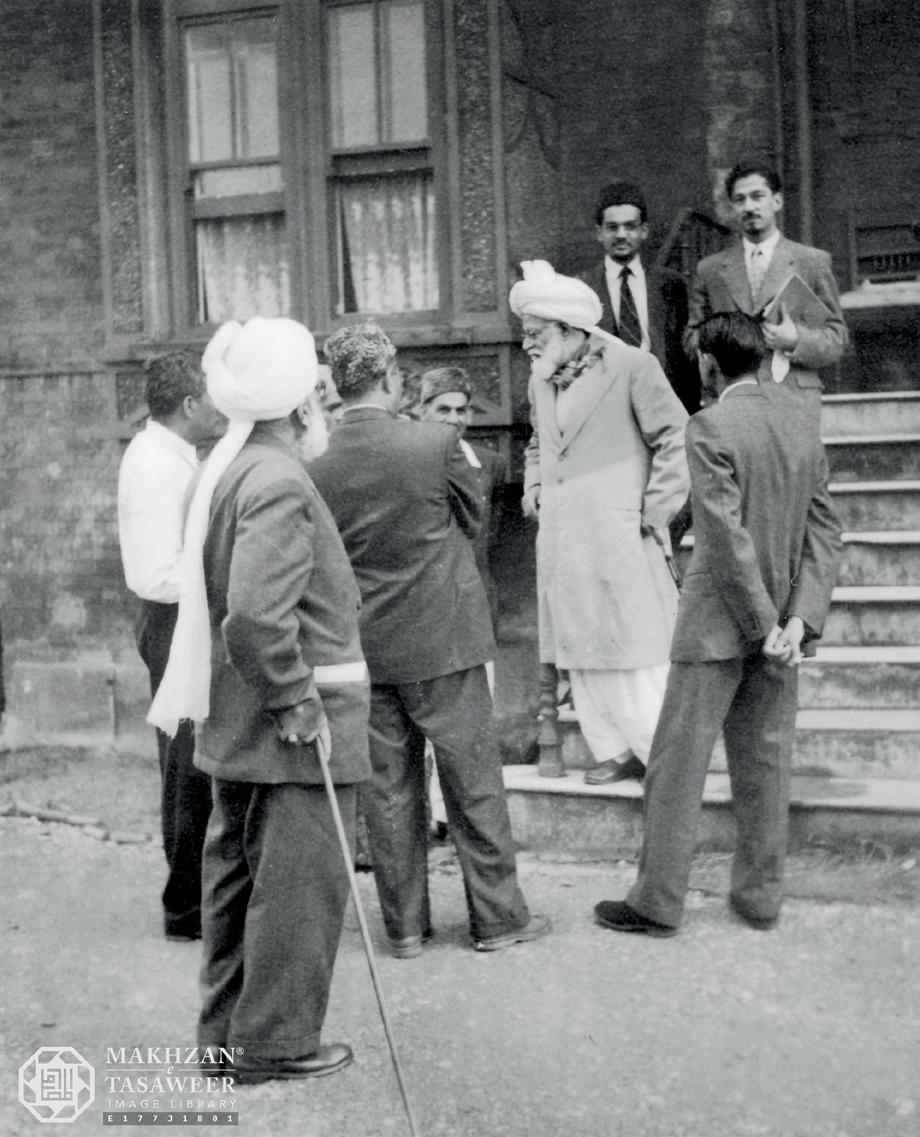
During this conference, the Ahmadi missionaries had the blessed opportunity to get valuable guidance from Hazrat Muslehe-Maudra, which played a great role in their tabligh efforts in the times to come.
Upon the conclusion of this Conference, Al Fazl published detailed reports in its 26 and 27 July 1955 issues.
During various sessions of the Conference, reports from Ahmadiyya missions around the world were discussed. The topics that were extensively discussed during the Conference included various proposals to speed up efforts to propagate Islam in Europe, Africa, and America. Various schemes were suggested to expand the publication of Islamic literature throughout the world, to build mosques and missions in new places, and to expand the already existing missions. All the missionaries once again affirmed their pledge to devote their lives to the propagation of Islam the world over, in accordance with the desires and expectations of Hazrat Muslehe-Maudra. (Al Fazl, 14 October 1955, p. 3)
“Zarreen Hidayaat Bara’ey Muballighin”
As stated by Hazrat Musleh-e-Maudra in his special message to the Jamaat, this was a very significant chapter in the history of Islam. However, one ought to remember
that even before this conference, Hazrat Musleh-e-Maudra granted valuable guidance to the missionaries on many occasions, and this practice continued in the following years as well.
During his address at the Jamia Ahmadiyya UK’s convocation in 2023, Hazrat Khalifatul Masih Vaa said that the guidance and advice to the missionaries granted by Hazrat Musleh-e-Maudra on various occasions has been compiled in book form under the title of “Zarreen Hidayaat Bara’ey Muballighin” and emphasised that all missionaries should obtain a copy of this book and study it. (“Essential traits of a successful missionary: Huzoor addresses graduates at Jamia Ahmadiyya UK convocation 2023”, Al Hakam, 19 May 2023, Issue 270, p. 2)
Hazrat Khalifatul Masih Vaa said:
“During his lengthy tenure as Khalifatul Masih, Hazrat Musleh-e-Maudra not only assured the spiritual advancement of the Community, but also consolidated its administrative system while propagating the Faith. He also provided excellent guidance to the murabbian [missionaries] and consolidated and organised their system too. He also gave advice at various times to the students and to the murabbian of Jamia Ahmadiyya. This advice, if followed by murabbian and muballighin, could serve as a catalyst for revolution. His advice was not only for the old murabbian but also for those Companionsra who had seen the era of the Promised Messiahas. When they were sent as murabbian and muballighin, he generally gave advice to them.
“This advice and guidance from Hazrat Musleh-e-Maudra has also been published in book form under the title ‘Zarreen Hidayaat Bara’ey Muballighin…’ [Golden Advice for Missionaries…]. Every murabbi and muballigh should indeed have this book at their disposal. They should study it and make notes for themselves. Then, as they continue to look at these notes, extract summaries and create points from them to keep at hand, and continue to view them, their attention will remain on improving their conditions, and it will
serve as a reminder. Therefore, make sure that you consult it.” (“Zarreen Hidayaat (Bara’ey Muballighin wa Tulaba)”, www. ahmadipedia.org)
Khulafa-e-Ahmadiyyat have continued to provide a pathway to the Ahmadi missionaries serving in various countries, who have played a great role in propagating the message of Islam to all corners of the world.
Another point that is worth mentioning here is that since the migration of Khilafate-Ahmadiyya to the United Kingdom, the Jalsa Salana UK has become the markazi (central) Jalsa. After the conclusion of Jalsa Salana UK, the Ahmadi missionaries and life devotees who are in attendance from various countries of the world are usually blessed with the opportunity to have a collective meeting with Hazrat Khalifatul Masihaa. During the meeting, missionaries present their reports to Huzooraa about the tabligh efforts in their respective countries, and more importantly, they get valuable guidance from Huzoor-e-Anwaraa in order to improve their work.
Friday 21 July 2023 | AL HAKAM 16
The Civil and Military Gazette, 23 July 1955
Hazrat Musleh-e-Maud at 63 Melrose Road, London, 1955
A glimpse into Jalsa Salana 1923
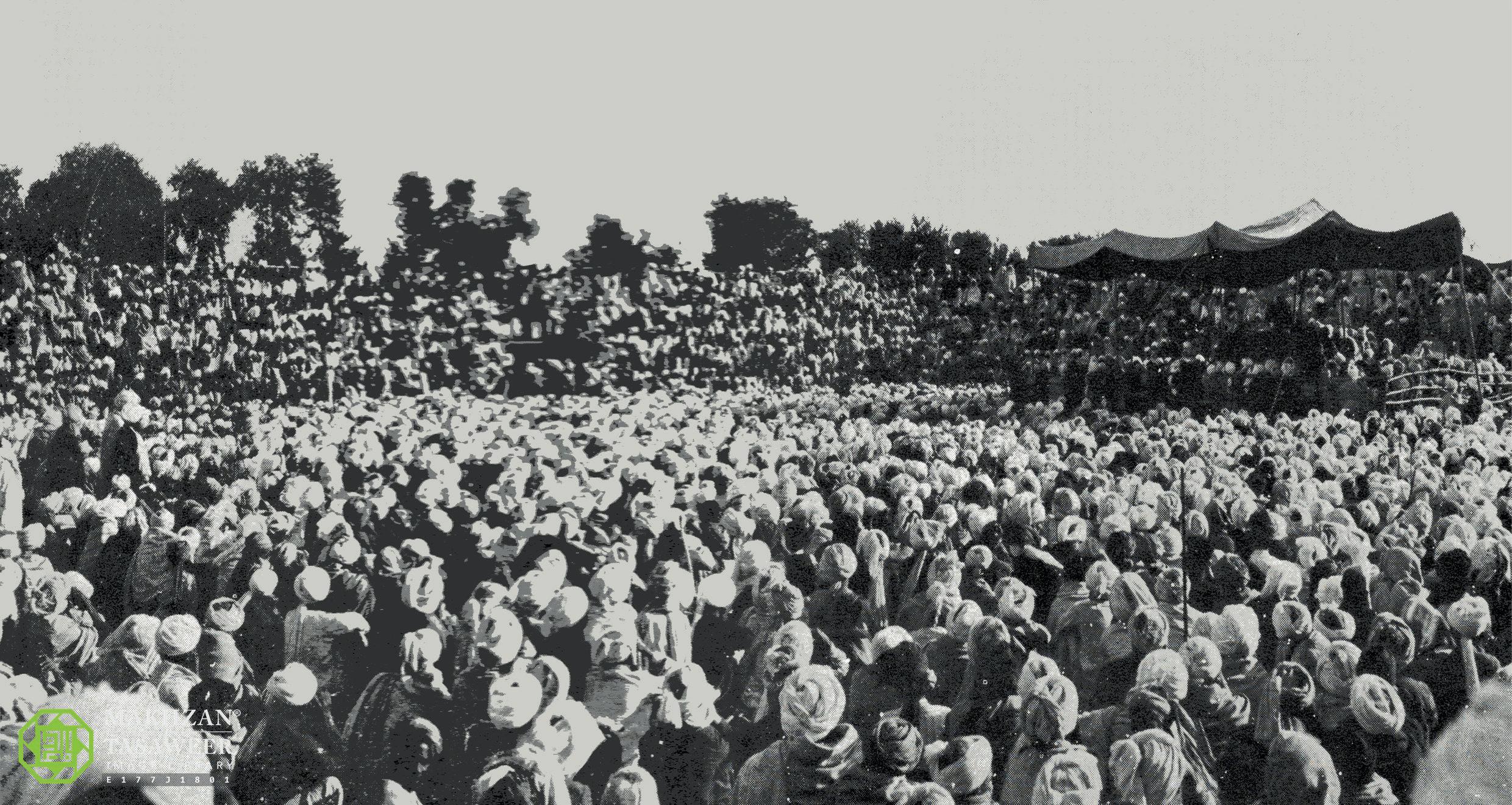
The annual Jalsa of the Ahmadiyya Community took place at Qadian on 26, 27 and 28 December 1923. Ever since the foundations of this annual Jalsa were laid by Prophet Ahmad[as], the Promised Messiah and the Founder of the Ahmadiyya Muslim Community, the Jalsa has regularly been held every year in the last week of December. It was only twice that the dates had to be changed on account of certain unavoidable causes.
The first Jalsa took place in December 1892 and thus the last Jalsa was the 32nd of its kind. The figures about the first Jalsa have been fortunately preserved, and from them, we learn that the number of Ahmadis who took part in it was 300 including the local Ahmadis of Qadian. With the expansion of the Ahmadiyya Movement, however, the Jalsa has also been gradually expanding, so much so that this year the number of visitors to Qadian during the Jalsa days was over 10,000.
Qadian, it will be noted, is a very small town with a population of about 4,500. Thus, the number of visitors was twice as large as the number of local residents.
These visitors came not only from all parts of the province but also from other parts of India, e.g., the UP, Behar, Bengal, Sindh, Bombay [now Mumbai], Hyderabad Deccan, Malabar, Kashmir, etc. For the entertainment of the guests, suitable arrangements were made by the local Ahmadiyya Community of Qadian. Hazrat Mirza Bashir Ahmad[ra] MA, the second son of the Holy Founder of the Movement, was in charge of the whole management and under him was placed a party of about 500 honourary workers.
<< Continued from page 15
parental and religious leadership played a pivotal role in imparting values, but today’s individuals find themselves increasingly detached and instrumentalized by market forces. The pervasive culture industry, with its mass media, mass market, and mass consumption, has permeated every facet of life, leaving people adrift in an overwhelming sea of influences. Consequently, a moral void has emerged, giving rise to widespread disorientation and a proliferation of values that lack a shared foundation. This situation has led to a dearth of common purpose and a decline in fostering empathy, cooperation, and social cohesion. The absence of a strong ethical underpinning hampers individuals and communities from effectively addressing critical societal issues and forging meaningful connections with one another. As a result, societies grapple with an ongoing struggle to establish a collective
Departments
The work of management was divided into the following heads:
1. Reception at the Batala Railway Station as well as at Qadian. The officer in charge of this work was also made responsible for arranging transport. Pickets of volunteers were placed at important places on the road.
2. Accommodation, i.e., arrangements for the housing of the guests and the supply of furniture, etc.
3. Preparation of food for the guests.
sense of purpose and shared values that can withstand the turbulent nature of modernity’s ever-changing influences.
The Promised Messiah’sas teachings have further illuminated the meaning of the last ten verses of Surah al-Kahf and provided insights into how to meet the challenges of modernity and confront the Antichrist. The Promised Messiahas, in keeping with his primary divine mission, spoke strongly for the reconciliation of man with God. Reflecting on his teachings, it becomes clear how important it is to reconnect with one’s spiritual being and strive for true freedom through detachment from the marketdriven world.
By acknowledging the harmful influences of modernity and striving to strengthen our faith and moral foundations, we can protect ourselves from the lure of the Antichrist’s deception. Emancipation from the pervasive influences of modern society is a prerequisite for true freedom
4. Supply of water.
5. Supply of light.
6. Distribution of food.
7. Attendance upon the guests.
8. Medical arrangements.
9. Sanitary arrangements.
10. Maintenance of stores of supply.
11. Management of the bazaar.
12. Management of the stage and the pandal [marquee].
and fulfilment. By reconnecting deeply with our spiritual values and understanding the meaning of our existence, we can resist the lure of nihilism and find a meaningful path to liberation from the shackles of the modern world. In so doing, we embrace the teachings of the Promised Messiahas and save our souls from the misleading path of the Antichrist.
While modernity has its merits, it is crucial for us to recognise both its benefits and challenges. It is all about how we choose to utilize and channel its advancements, ensuring that they serve the greater purpose, as intended by the Promised Messiahas Embracing the teachings of Islam and nurturing a strong ethical underpinning can help us navigate the trials of modernity while upholding our values and fostering a sense of unity and purpose.
Role of Jalsa Salana
13. Enquiry office, to which was attached the office of making announcements of lost property.
14. Inspection.
15. Watch arrangements, especially for nights and the Jalsa of the ladies.
16. General supervision. These different offices were placed in charge of different men, who were assisted by a suitable number of assistants and
Continued on page 19 >>
In this endeavour, the Jalsa Salana plays a central role. By inculcating Islamic values, it contributes not only to the spiritual capital, ultimately paving the way for salvation in the afterlife, but also to the social capital of Ahmadi Muslims, promoting compassion and altruism.
The great importance of both gathering and worship in the face of the Antichrist and the challenges of modernity underscores the need for the Jalsa Salana to provide a unifying platform for the Ahmadiyya Muslim Jamaat. The teachings of the Promised Messiahas resonate with profound wisdom that offers a path to liberation from the pitfalls of contemporary society. As we navigate the uncharted waters of modernity, it becomes increasingly important to heed what the Jalsa Salana teaches us, such as compassion in action, strengthening social bonds, spiritual enlightenment, promoting community service, etc.
17 AL HAKAM | Friday 21 July 2023
Sudan conflict and Islamic solutions
 Ali Fatty Student Jamia Ahmadiyya International Ghana
Ali Fatty Student Jamia Ahmadiyya International Ghana
The current conflict in Sudan is an armed conflict between the Sudanese Armed Forces (SAF) and the paramilitary Rapid Support Forces (RSF), the rival factions of the military government of Sudan.
This ongoing war in South Sudan has raised many concerns about the future of the country. According to preliminary updates, dozens of individuals from both military factions and innocent civilians have lost their lives due to this latest escalation. Several women and children have become victims of the war. Lack of access to basic commodities and social facilities for life’s sustenance has become a serious humanitarian crisis.
According to a report by the United Nations, South Sudan is recognised as the least developed country (LDC), where over half of its population of 8.3 million people is estimated to live in conditions of extreme poverty. Recently, the South Sudanese marked their independence anniversary, commemorating their secession from Sudan in 2011. Regrettably, the period following South Sudan’s independence has been marred by numerous devastating conflicts and ineffective governance, according to critics. (“South Sudan joins list of least developed countries, bringing global total to 49”, https://unctad.org/)
Recently, the United Nations General Secretary, Antonio Guterres, warned that Sudan is on the brink of a full-scale civil war, potentially destabilising the entire region. (“The world is in ‘great peril,’ U.N. chief warns global leaders”, www.nbcnews.com/)
Last month, a deadly fight broke out in a poor market between the two military factions, leaving at least 27 people dead in Mayo, the neighbourhood of South Sudan’s capital. This happened after a truce treaty, which was mediated by Saudi and US authorities, failed.
The Sudanese Doctors Trade Union stated: “Medical staff are under pressure to deal with so many cases with limited staff. We invite all nearby physicians and medical personnel to visit the hospital so that they can provide as much assistance as possible.” (“Sudan: 27 detailed killed in shelling of market in poor area south of Khartoum”, www.mamostv.tv/)
An eyewitness to the shelling of the market and a volunteer at the Al-Bashir Hospital, Abdelmotal Saboon, commented: “In fact, it was the worst day I’ve ever witnessed, with scenes of men, women, and children in terrible condition that I will always remember. I have no idea why the heavy artillery was used, other than to kill innocent people.” (Ibid.)
Mohammed Zain, a resident of Mayo, said: “Since all of our relatives are here, they cannot flee because no one can afford to leave”. (Ibid.)
Khartoum, the capital of Sudan, is
home to almost 10 million people. It has 54 hospitals, but as of 21 April, only four were reported to be in operation, which has worsened the humanitarian crisis in the country. (“Sudan updates: Warring factions to hold direct talks”, www.dw.com/)
Many Africans on the continent and in the diaspora have raised their displeasure with the regional bloc AU for failing to mitigate peace talks successfully between
parts of the country where gold mining is dominant. Yevgeniy Prigozhin, the founder of the Russian mercenary force Wagner, has been accused of manipulating Sudan’s gold reserves by creating internal conflicts within the army. (www.bbc.com/news/ world-africa-65328165)
“Yevgeniy Prigozhin and his network are exploiting Sudan’s natural resources for personal gain and spreading malign
Wagner Group’s role?”, www.aljazeera.com/)
Similarly, it is reported that the Wagner Group abetted former president Omar AlBashir to maintain his self-perpetuating rule in Sudan by campaigning for him even in the media, says Dr Samuel Ramani, author of a book about Russia’s activities in Africa. “Prigozhin was calling for […] the protestors to be accused of being pro-Israel and anti-Islamic,” he says. (www.bbc.com/ news/world-africa-65328165)
The start of the conflict between the two military factions
When General Abdel Fattah al-Burhan toppled the government of Omar Al Bashir, the Wagner forces simultaneously swapped their backing to the general, ruling the country with his deputy, who is the commander of the RSF (Rapid Support Forces).
When the two commanders also parted, leading to the current war we are witnessing, the Wagner Forces dubiously did not show open support to either of them. Instead, they remain on the fence to watch the leaders’ fight.
According to Kholood Khair of the Confluence Advisory, a think-tank on Sudanese affairs, Wagner is not choosing sides in the conflict because “Wagner has had links to both General al-Burhan’s enterprises and to Mr Hemedti’s enterprises to different extents and in different ways,” she says. (www.bbc.com/news/world-africa-65328165)
Multiple sources indicate that the Wagner Group is seeking to increase its gold mining operations in Sudan through its partnerships with Meroe Gold and M-Invest.
Islamic solutions to conflict resolution
Sudan’s military leaders to restore peace and order in the country.
Moreover, there is a belief among many that peace agreements mediated by external countries or organizations, often non-African entities, are driven by hidden motives. It is argued that these parties have occasionally exploited the vulnerabilities of such nations, clandestinely extracting their valuable natural resources.
Satellite images show Wagner forces’ gold mining operations in Sudan
Sudan is Africa’s third-biggest gold producer. Satellite images examined by various media sources and the open-source group “All Eyes on Wagner” reveal a Russian transport plane shuttling between two major Libyan airbases. These airbases are linked to Haftar and used by a sanctioned Russian fighting group. The purpose of these flights is to supply deadly weapons to RSF leader General Hemedti, who controls
influence around the globe,” opined thenUS Treasury Secretary Steven Mnuchin in 2020. (www.bbc.com/news/worldafrica-65328165)
In July last year, CNN investigated the Wagner Forces’ gold mining activities in Sudan, and their findings have since been authenticated by the European Council, which stated that, “Through its affiliation with the Sudanese army, the Wagner Group has secured the right to mine Sudanese gold and export it to Russia”. (https://edition. cnn.com/2023/02/27/europe/russia-wagnersudan-gold-sanctions-eu-intl/index.html)
The Wagner Private Military Company and its founder, Yevgeniy Prigozhin, have had some engagements in Sudan previously monitored by international organisations. It is said that when they initially arrived in Sudan around 2017, they started their operations with then-President Omar al Bashir, showing alliances and unflinching support for him until he was ousted from office by General Abdel Fattah al-Burhan. (“Russian mercenaries in Sudan: What is the
The Holy Quran has guided Muslims in all aspects of their lives, whether it is the ways of fostering peace and love among themselves or the methods of conflict resolution in times of conflict. These golden teachings, if acted upon by the world, will serve as a great means of creating peace around the globe.
In the world today, it is common for people to act unjustly towards others out of enmity, but Allah the Almighty tells us in the Holy Quran:
“O ye who believe! Be steadfast in the cause of Allah, bearing witness in equity; and let not a people’s enmity incite you to act otherwise than with justice. Be always just, that is nearer to righteousness. And fear Allah. Surely, Allah is aware of what you do.”
(Surah
al-Maidah, Ch.5: V.9)
Since the start of the war in Sudan, the voice of Hazrat Mirza Masroor Ahmad, Khalifatul Masih Vaa, is constantly heard echoing in the African continent, addressing the Sudanese leaders and their citizens to come to terms and allow peace to rein in their country, rather than pursuing their self-centred desires. This has always been the way of Huzooraa, not just in relation to Sudan or Muslim countries.
Friday 21 July 2023 | AL HAKAM 18
Boston Public Library | Picryl
On 6 October 2015, during the keynote address of Hazrat Mirza Masroor Ahamdaa at the Standing Committee for Foreign Affairs in the Netherlands National Parliament, he beautifully explained this teaching of Islam:
“Islam teaches that no opportunity for peace should be wasted and so even if there is only a glimmer of hope then you must try and grasp it. In chapter 5, verse 9, Allah the Almighty has proclaimed that the enmity of a nation or people should never incite you to act otherwise than with justice and fairness. Islam teaches that in all circumstances, no matter how difficult, you must remain firmly attached to the principles of justice and integrity. Thus, even in a state of war, justice and fairness are of paramount importance and when a war concludes, the victor must continue to be just and never resort to undue cruelty.” (“World Peace & Security – Critical Issues of Our Time”, www.reviewofreligions. org/)
In Chapter 49, verse 10, of the Holy Quran, the Islamic approach to brokering peace between two parties involved in conflict is best explained in the statement of Hazrat Amirul Momineenaa:
“A golden principle for the establishment of peace is given in chapter 49, verse 10 of the Holy Qur’an, where it says that if there is a dispute between nations or groups, third parties should seek to mediate and to bring about a peaceful resolution to the conflict.
“In the event of an agreement, if either party unjustly seeks to subjugate the other and contravenes the negotiated settlement, then the other nations should unite together and use force if necessary to stop the aggressor. However, once the aggressive party withdraws, they should not be humiliated or unduly restricted. Rather, they should be permitted to move forward as a free nation and a free society. This principle is of great significance in today’s world and in particular for the major powers and international organisations such as the United Nations, to act upon. (Ibid.)
An exemplary incident that showcases the Holy Prophet’ssa approach to conflict resolution, which Muslims of all generations take pride in, is the Treaty of Hudaybiyyah. This incident ultimately led to the triumph of Muslims in Mecca. Despite the peace terms and conditions presented by the Meccans seemingly not favouring the Muslims, the Holy Prophetsa agreed to all of them in order to establish peace. This act of accepting the peace agreements, even when they appeared disadvantageous, exemplifies the Prophet’s
commitment to fostering harmony.
Professor Stanley Lane-Poole, a British orientalist and archaeologist, who was also a Professor of Arabic Studies at Dublin University, wrote: “The day of Muhammad’s greatest triumph over his enemies was also the day of his grandest victory […] He freely forgave the Quraish all the years of sorrow and cruel scorn they had inflicted on him, and he gave an amnesty to the whole population of Makkah. The army followed his example and entered quietly and peaceably. No house was robbed, no woman insulted […] It was thus that Muhammad entered again his native city. Through all the annals of conquest, there is no triumphant entry comparable to this one.” (Lane-Poole, S. (1882), The Speeches and Table Talk of the Prophet Muhammad, London, MacMillan; www.reviewofreligions. org/12971/ways-to-establish-world-peacethe-khalifah-in-canada/)
Regarding this statement, Hazrat Khalifatul Masih Vaa expressed:
“Thus, this writer testifies to the fact that at the time of triumph, the Holy Prophetsa did not seek glory and nor did he seek vengeance against those who had tormented him and his followers. Rather, his response was to grant forgiveness to each and all alike.
(Ibid.)
Hazrat Khalifatul Masih Vaa, during his Eid-ul-Fitr sermon delivered on 2 April 2023, prayed for peace to reign in Sudan and urged members of the Ahmadiyya Muslim Community to remember Sudan and all the warzone areas around the world in their prayers. Huzooraa said:
“We shall now pray and pray for humanity in general, particularly those who are hungry without food. In fact, they do not even have access to a drop of water. Currently, the people in Sudan are being afflicted by the turmoil there, and despite being Muslims, they are not only deprived of the joy of Eid; in fact, they have become a target of various kinds of injustices at the hands of fellow Muslims. They have to witness their loved ones; innocent children die in agony before their eyes, owing to the actions of their leaders and those who desire power.
“May Allah the Almighty grant them wisdom and create ease for those who have been deprived. We do not have the means to physically help them by going there, but we can at least help them by praying for them.”
(https://youtu.be/vJ4ewMwZ4qI?t=1900)
<< Continued from page 17
volunteers. The Private Secretary of His Holiness, the Khalifat-ul-Masih II[ra] was helped by an extra staff member in the work of arranging interviews between the Khalifat-ul-Masih and the parties of guests.
Jalsa Gah
The Jalsa took place in the Noor Mosque near the High School buildings, where a large number of temporary galleries were set up for the convenience of the visitors.
Arrival of guests
The guests began to arrive on 20 December. But the greatest rush of visitors was on 25 and 26, with the largest number of guests entertained on the night of 27, when their number rose to ten thousand and eight hundred.
The programme of the Jalsa was as follows:
26 December 1923
9:30-10:30am: Refutation of Objections against Prophecies of Ahmad[as] concerning Ahmad Beg and Lekhram by Mir Qasim Ali Sahib
10:30-11:30am: Prophecies of the Promised Messiah[as] by Maulvi Syed Sarwar Shah Sahib
11:30-12pm: Annual report of the Sadr Anjuman Ahmadiyya, Qadian by the Secretary
12-1pm: The Truth of the Promised Messiah’s[as] Claims by Hafiz Roshan Ali Sahib
2-3pm: Refutation of the Objections of Muhammad Ali Mongheri by Hakim Khalil Ahmad Sahib
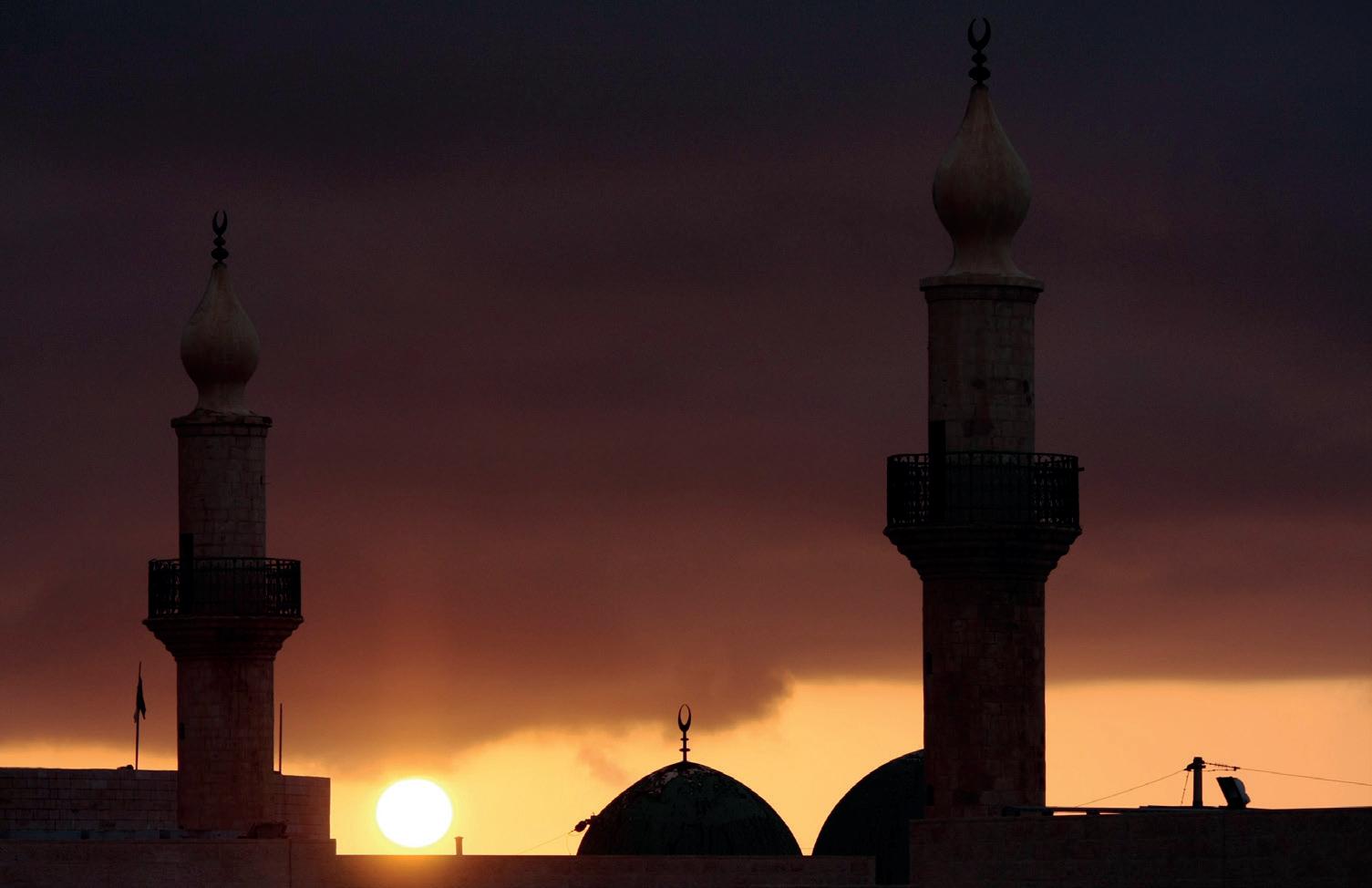
3-4pm: Annual Report of the Nazarat (The Secretariat) by the Chief Secretary
4-4:30pm: Sacrifice Essential for National Progress by Hazrat Mirza Sharif Ahmad Sahib
4:30-5pm: The Malkana Rajputs and Bhajans concerning them by Master Muhammad Shafi Aslam Sahib
27 December 1923
9:30-10:30am: The Apostasy Movement and Our Responsibility by Chaudhry Fateh Muhammad Sayal MA
10:30-10:45am: Financial Report of the Year (1923) by Financial Secretary
10:45-11am: Our Missionary Work in Foreign Countries by Dr Mufti Muhammad Sadiq Sahib
Afternoon: Lecture of His Holiness, Hazrat Khalifat-ul-Masih II[ra]
28 December 1923
9:30-10:30am: The Antiquity of Matter and Soul by Mir Muhammad Ishaq Sahib
10:30-11:30am: Prophecies of the Bible concerning the Holy Prophet[sa] by Maulvi Rahim Bakhsh Sahib MA
11:30-12:30pm: The Attack of Ahmadis upon Christianity and its Effect by Chaudhry Zafrulla Khan Sahib (Bar-at-Law)
Afternoon: Lecture of His Holiness, Hazrat Khalifat-ul-Masih II[ra]
Speeches and lectures
The speeches were generally very well delivered and were listened to with attention.
His Holiness, Hazrat Khalifat-ulMasih II[ra] gave two lectures, i.e., one in the afternoon of 27 and the other in the afternoon of 28. At the time of his speech, the pandal was packed to the brim, and the audience listened to his lecture with rapt attention.
The first lecture of His Holiness related to the general review of the activities of the Ahmadiyya Community during the past year, at the end of which he gave some very fine pieces of advice to the audience.
The second lecture His Holiness was on Salvation. I may note here that last year too, His Holiness spoke on this very subject, but as he could not finish it, he decided to take up the same subject this year. This lecture lasted for about 5 hours, and if we add to it the 8 hours of the last year, it makes 13 full hours in which the learned lecturer could finish his lecture on Salvation. After explaining the importance of the subject, His Holiness explained at some length the views held by the followers of different religions about Salvation. Then he proceeded to explain the teachings of Islam about this important subject, and with cogent reasons and powerful arguments, he proved the superiority of Islam over all other religions in this respect. He explored all the possible avenues of the subject, and his lecture was one solid mass of scientific research and heavenly knowledge. Towards the end, he explained the different aspects and stages of salvation and described how they could be achieved in Islam.
The Jalsa ended with prayers.
Lajna Imaillah
Our female visitors this year were no less than 1000, and for them, a separate Jalsa was arranged. His Holiness, Hazrat Khalifat-ulMasih II[ra] also gave one lecture.
New converts
Among the visitors, male and female, there was a large number of non-Ahmadis, most of whom entered into bai‘at before leaving. The number of those who joined the Ahmadiyya Movement in the Jalsa days was over 500.
Mazhabi Sikhs
It will not be out of place here to mention that for the last few months, our missionary department has been paying special attention to missionary work among the Mazhabi Sikhs. Sardar Khazan Singh, the well-known leader of the party, was approached, the beauties of Islam were explained to him, and he was invited to enter the fold of Islam, which alone could raise the status of the depressed classes; and thank God, the efforts of our workers have been crowned with success, for in the Jalsa days, Sardar Khazan Singh, with a large party of his followers, declared his Islam and became a Muslim. His conversion has created a great stir in the Community of Mazhabi Sikhs in the province, and it is hoped that before long most of them will turn to Islam.
(Transcribed and edited by Al Hakam from the original, published in The Review of Religions [English], February 1924)
19 AL HAKAM | Friday 21 July 2023
Mario La Pergola | Unsplash
Friday Sermon
Mubarak Mosque, Islamabad, Tilford, UK

23 June 2023
Muhammadsa: The great exemplar
After reciting the tashahhud, ta‘awwuz and Surah al-Fatihah, Hazrat Khalifatul Masih Vaa stated:
As was mentioned in the previous Friday Sermon, the informants of the Holy Prophetsa returned and revealed the news of an approaching caravan or army.
When the Holy Prophetsa learnt of the news that the army of the Quraish was approaching in order to protect their trade caravan, he sought counsel from his companions and informed them of the situation regarding the Quraish. Upon this, Hazrat Abu Bakrra stood up and delivered an excellent speech, following which Hazrat Umarra also stood up and delivered an excellent speech. Thereupon, Hazrat Miqdad bin Amrra stood up and humbly submitted, “O Messengersa of Allah! March towards that which you have been commanded by Allah. We are with you. By Allah, we will not say to you what the Israelites said to Mosesas:
نودعق انھه انا التاقف كبرو تنا بهذاف
“That is, ‘Go thou and thy Lord and fight, and here we sit.’ (Surah al-Ma’idah, Ch.5: V.25)
“In fact, we will say, ‘You and Your Lord go ahead for battle and we too shall join with you in the battle. By Allah, Who has raised you as a Prophet with the truth, even if you lead us to Bark al-Ghimad, we will march with you.’”
In relation to Bark al-Ghimad, it is written that it is located in Yemen, at a distance of a five-day journey from Mecca. This was a metaphor used by the Arabs, signifying a long distance. Following this, he said: “We will continue fighting the enemy along your side until you reach your destination.” The Holy Prophetsa wished them well and prayed for them. (Ibn Hisham, Al-Sirah al-Nabawiyyah [Beirut, Lebanon: Dar al-Kutub al-‘Ilmiyyah, 2001], pp. 420-421; Abu al-Kalam Azad, Ghazwat al-Nabisa, p. 30, City Book Point, 2014)
A historian has written that Bark al-Ghimad was located to the south of Mecca, at a distance of approximately 430
kilometres, away from the main route of travel in a far-off place. Due to the long distance and difficulty of travelling there, it was used as an idiom, just like Koh-e-Qaf [Mount Qaf] in Urdu signifies and connotes a long distance. This meant that regardless of how far the Holy Prophetsa would go, they would remain by his side. (Da’irah Ma‘arif Sirat Muhammadsa Rasul Allah, Vol. 6, p. 139, Bazam Iqbal, Lahore, April 2022)
We also find some elaboration in relation to this because some historians have raised the question in relation to this that the verse Hazrat Miqdadra recited was from Surah al-Ma’idah and this Surah was revealed much later. As such, it seems doubtful that this verse was recited on this occasion. Nevertheless, the scholars also present some possible explanations for this, for example, they may have heard this statement of the Israelites from the Jews [of Medina], or that one of the later narrators might have added this verse. In any case, this objection does not carry much importance, since this narration has been quoted frequently in the books of history. As such, in a commentary of Bukhari, Fath-ul-Bari by Ibn Hajjar, it is written that to say that the entire Surah al-Ma’idah was revealed on the occasion of Hajjat-ul-Wida [farewell pilgrimage of the Holy Prophetsa] is incorrect. Some of its verses had been revealed much earlier. Hazrat Miqdadra recited one of these verses on the occasion of the Battle of Badr. Nevertheless, for the Muslims to have heard this from the Jews could also be true.
It is further narrated that these three, i.e., Hazrat Abu Bakrra, Hazrat Umarra and Hazrat Miqdadra were among the Muhajirin, which is why the Holy Prophetsa desired to seek the opinion of the Ansar. (Maulana Safi al-Rahman Mubarakpuri, Al-Rahiq al-Makhtum, p. 285, Al-Maktabah alSalafiyyah, Lahore; Fath al-Bari, Vol. 2, p. 201, with reference to (Da’irah Ma‘arif Sirat Muhammadsa Rasul Allah, Vol. 6, p. 139,
Bazam Iqbal, Lahore, April 2022)
The Holy Prophetsa thus said, “O people, give me your counsel,” and in actuality sought the suggestion from the Ansar. Perhaps another reason for this is that during the Pledge of Aqabah, they [i.e., the Ansar] said, “O Messengersa of Allah, whilst you do not come to our city, we are
not responsible for you, but when you do come to Medina, we will most certainly be responsible for you. We will protect you from everything, just as we protect our children and our women.” Therefore, the Holy Prophetsa was expressing his concern that the Ansar would only defend against the enemy who launch an attack on Medina,
Friday 21 July 2023 | AL HAKAM 20
thinking that it was not incumbent upon them to face the enemy outside of their city. However, when the Holy Prophetsa stated this, Hazrat Sa’d bin Muazra said, “O Messengersa of Allah! Perhaps it is our counsel that you seek.” The Holy Prophetsa replied in the affirmative. Hazrat Sa’dra then said, “Indeed, we have believed in you, testified to your truthfulness, and borne witness that the religion you have brought is the truth. Moreover, we have made a promise to you and made a firm oath to follow your instructions. O Messengersa of Allah, go forth wherever you please, we are with you. We swear by that Being, Who has sent you with the truth, that if you take us to the sea and you go in yourself, we shall also dive into it with you, and not a single one of us shall hold back. We are not displeased if you take us tomorrow to face the enemy. We are steadfast in battle, we show loyalty when encountering the enemy, and we are hopeful that Allah the Almighty will show you that we can attain those feats, which shall be the delight of your eyes. So, with the blessings of Allah, take us with you.”
In a narration of Sahih Muslim, these words have been ascribed to Hazrat Sa’d bin Ubadahra, however, according to the majority of the narrations, Hazrat Sa’d bin Ubadahra did not participate in the Battle of Badr, and therefore, the historians have tried to consolidate between the two narrations and suggested that perhaps the Holy Prophetsa took counsel on two occasions. The first took place in Medina when he received news of the caravan, and Hazrat [Sa’d bin] Ubadahra made this statement, and the second time the Holy Prophetsa took counsel was when he was en route and Hazrat Sa’d bin Mu’azra spoke these words. In any case, this is what the various commentators have written in their commentary, but in reality, it was Hazrat Sa’d bin Mu’azra who said this. Hearing this from Hazrat Sa’dra, the Holy Prophetsa was filled with joy and stated, “Go forth and rejoice in the glad tidings; Allah the Almighty has promised me victory over one of the two parties. I swear by God that at this very time, I am witnessing the places where the enemy men shall fall after being slain.” (Ibn Hisham, Al-Sirah al-Nabawiyyah [Beirut, Lebanon: Dar al-Kutub al-‘Ilmiyyah, 2001], p. 421; Sharh al-Zurqani ‘ala al-Mawahib alLaduniyyah, Vol. 2 [Beirut, Lebanon: Dar al-Kutub al-‘Ilmiyyah, 1996], p. 270)
Hearing these words, the companions became joyful, but at the same time they said in surprise:
دعتسنف لاتقلا انل تركذ اله
“O Messengersa of Allah! If you had known of the army of the Quraish from before, why then did you not mention to us the prospect of war whilst we were still in Medina, so that we may have prepared before setting out?”
However, despite this news and counsel, and despite this glad-tiding conveyed by the Holy Prophetsa from Allah, which indicated that the Muslims would definitely attain victory over one of these two parties, until now, the Muslims had not yet found out which party they would encounter. They realised the possibility of confronting one of these two groups, and naturally desired to encounter the weaker of the two, i.e., they desired to confront the caravan. (Sirat Khatam-un-Nabiyyin, Hazrat Mirza Bashir
Ahmadra, p. 355, 1996 Edition)
Hazrat Musleh-e-Maudra writes in this regard:
“When, at the time of Badr, a battle was about to ensue outside of Medina, the Holy Prophetsa gathered all the Companions and said, ‘O people, I seek your counsel, for I have come to know that we will not fight against the caravan. Instead, we will face off against the army of Mecca. One after another, the Muhajirin Companions stood up and submitted, ‘O Messengersa of Allah, you may certainly go forth for battle. We are with you.’ However, every time a Companion would express their thoughts, the Holy Prophetsa would follow to say, ‘O people, I seek your counsel.’ The Holy Prophetsa thought that although the Muhajirin were giving their suggestions, it was the Ansar that were truly in question. The Ansar were silent because the aggressors were the people of Mecca. The Ansar thought that if they expressed their readiness to fight the Meccans, perhaps the Muhajirin may feel offended and they may dislike it if they expressed their eagerness to kill their kinsmen. However, after the Holy Prophetsa repeatedly sought counsel, a Companion from the Ansar stood up and said, ‘O Messengersa of Allah, you have been given counsel. One after another, a Muhajir stands and affirms their willingness to fight, yet you continue to ask the people for counsel. From this, it seems as though you are addressing the Ansar.’ The Holy Prophetsa replied in the affirmative. The Companion then said, ‘O Messengersa of Allah, we were silent for fear of causing anguish to our Muhajirin brothers. If we expressed our willingness to fight, the Muhajirin may think that we are proposing to kill their families and kinsmen.’ He further said, ‘O Messengersa of Allah, perhaps you are referring to the pledge we made at Aqabah, wherein we pledged to assist you should the enemy attack Medina and that we would not be liable for a battle taking place outside of Medina.’ The Holy Prophetsa said, ‘Yes, this is the matter indeed.’ The Companion replied, ‘O Messengersa of Allah, at the time we made that covenant, we did not fully understand your true status. O Messengersa of Allah, your truth has manifested itself to us and your status is clear to us. That covenant holds no importance. The sea is before us. If you so much as give the command, we are prepared to ride into it on our horses. If a battle takes place, by God, we will fight on your right and your left, and we will fight in front of you and behind you. The enemy will not be able to reach you unless they trample over our corpses.’” (Sair-e-Ruhani, Anwarul-Ulum, Vol. 24, pp. 532-533)
Following this counsel, the Holy Prophetsa departed from that place and, by taking various routes, arrived close to Badr.
Details about Badr have already been mentioned previously, but I will present them once more. Badr is located 150 kilometres southwest of Medina. Its landscape is an oval-shaped and desert-like plain, measuring five and a half miles long and four miles wide. It is surrounded by tall mountains and had many wells and orchards where caravans would often set up camp. A short while after arriving close to Badr, the Holy Prophetsa and Hazrat Abu Bakrra set out on their mounts until they encountered an old Arab man. Without revealing their identities, they asked the old man about the Quraish and about Muhammadsa, peace
and blessings of Allah be upon him, and his followers. The old man replied, “I will only tell you when you tell me what tribe you belong to.” The Holy Prophetsa replied, “After you tell us about what we asked, we too, shall tell you about ourselves.” “One thing in exchange for another?” the old man asked. The Holy Prophetsa replied in the affirmative. The old man said, “I have come to know that Muhammad[sa] and his followers departed [from Medina] on such and such a day. If my informant is true, then they must be at such and such a place at this time.” The old man mentioned the name of the place where the Holy Prophetsa had arrived. He further stated, “I have also come to know that the Quraish departed on such and such a day. If my informant is true, then they must have reached such and such a place.” He mentioned the name of the place where the Quraish were, in fact, positioned. Both of his statements were correct. After giving this information, the old man inquired, “What tribe do you belong to?” The Holy Prophetsa replied, “We are from the water.” Following this, the Holy Prophetsa turned away from him. The old man asked, “You are from the water? What does that mean? Are you referring to the water of Iraq?”
The Holy Prophet’ssa answer here seems to have more than one meaning. Historians have also discussed this at length. Our team tasked with extracting references has also extracted the viewpoints of historians regarding this. I will present a summary of this. Historians have raised the point that the Holy Prophetsa did not give the correct response that he promised. Other historians have refuted this by saying that the Holy Prophetsa did not give him a false answer. Indeed, the Holy Prophetsa responded ambiguously so as not to lie, nor reveal his exact origins, especially during circumstances of danger and war. The Holy Prophet’ssa statement about being from the water refers to the Quranic statement, “We made from water every living thing.” This has been mentioned by one of the historians by the name of Abu Bakr Jabir al-Jaza‘iri.
Another historian says that it was an Arab custom to refer to the names of a water source or water springs of the area to indicate the area in which one resides. This is what ‘Allama Burhan Halabi has stated in this regard. Another possible explanation could be that the Holy Prophetsa was referring to the same water spring that they had settled around in Badr, which was also mentioned by the old man, but indicated to it in a manner that caused the old man to mistake it for the direction of Iraq. In this case, the direction of the water spring and Iraq would be the same. Nonetheless, Allah knows better.
Thereafter, the Holy Prophetsa returned to the Companions. In the evening, the Holy Prophetsa sent Hazrat Alira, Hazrat Zubair bin al-Awwamra and Hazrat Sa’d bin Abi Waqqasra along with a few other companions, towards the water spring in Badr in order to gather further information. There, they encountered two slaves from the Quraish who were tasked with fetching water. The companions apprehended them and began to question them, at the time the Holy Prophetsa was standing and offering prayers. Both of them admitted that they were sent to fetch water for the Quraish. The Companions did not accept what they said and suspected that they were hired by Abu
Sufyan. Thus, the Companions treated them in a rather harsh manner. Upon continuing with their strong approach, they said that they were hired by Abu Sufyan, upon which the Companions released them. Upon concluding his prayer, the Holy Prophetsa said, “When they told you the truth, you hit them, and when they lied to you, you released them. By God, they have spoken the truth. They are undoubtedly the slaves of the Quraish.” Then, addressing the two slaves, the Holy Prophetsa said, “Tell me about the Quraish.” They responded, “By God, their encampment is behind that hill on the other end of the valley.” The Holy Prophetsa then asked, “How many are they?” They responded, “They are many.” When they were asked as to their exact number, they said that they did not know. The Holy Prophetsa then asked, “How many camels do they slaughter each day for consumption?”
They replied, “Some days, they slaughter 10 camels, while other days they slaughter nine.” Upon this, the Holy Prophetsa said, “They number between 900 and 1000.” The Holy Prophetsa made this estimation based on the number of camels they consumed. The Holy Prophetsa then asked them which chieftains of the Quraish were among them. They named a number of Quraishi chieftains, including Abu Jahl, ‘Utbah, Shaybah, Hakim bin Hizam, Umayyah bin Khalaf, and so on. The Holy Prophetsa then turned towards the people and said,
“Observe, Mecca has thrown before you its heroes.”
(Ibn Hisham, Al-Sirah al-Nabawiyyah [Beirut, Lebanon: Dar al-Kutub al-‘Ilmiyyah, 2001], pp. 421-422; Atlas Sirat Nabawisa, p. 216, Dar al-Islam, 1424 AH; Abu Bakr Jabir al-Jaza’iri, Habib Do Alam [translated], p. 185, Zia al-Quran Publications, Lahore, 2015; Allamah Burhan Halabi, Ghazwat alNabisa, p. 81, Dar al-Isha‘at, Karachi, 2001)
Hazrat Mirza Bashir Ahmad Sahibra has also written about this in the following words:
“The Holy Prophetsa addressed the Companions, saying:
“‘Here you are! Mecca has thrown before you its greatest heroes.’ These were immensely intelligent and wise words, which the Holy Prophetsa uttered spontaneously. The reason being, that instead of the weaker Muslims becoming disheartened upon hearing the names of so many renowned chieftains of the Quraish, these words led their faculty of perception to believe as if God had sent these leaders of the Quraish to serve as prey for the Muslims.” (Sirat Khatam-un-Nabiyyin, Hazrat Mirza Bashir Ahmadra, p. 356, 1996 Edition)
Following this, the Holy Prophetsa ordered his army to march ahead so that they could reach the well of Badr before the arrival of the idolaters and so that the idolaters would not get the upper hand. Hence, the Holy Prophetsa reached the closest well to Badr at Isha time. (Maulana Safi al-Rahman Mubarakpuri, Al-Rahiq al-Makhtum, p. 288, Al-Maktabah alSalafiyyah, Lahore)
On this occasion, Hazrat Hubbab bin al-Mundhirra made a suggestion. When the Holy Prophetsa reached the closest well to Badr, Hubbab bin al-Mundhirra said: “O
21 AL HAKAM | Friday 21 July 2023
اهدبك ذالفأ مكيلإ تقلأ دق ةكم اذه
اهدبك ذالفأ مكيلإ تقلأ دق ةكم اذه
Messengersa of Allah! Have you encamped here under divine command and that we should not move from this place, or is this merely your opinion and a war strategy?”
The Holy Prophetsa replied: “This is based on conjecture and merely a war strategy.” Hearing this, Hubbab bin al-Mundhirra said: “This place is not ideal. It would be better to advance and take possession of the spring located closest to the Quraish. Furthermore, seal up all the other wells and prepare a reservoir for us. As a result, when we combat the enemy, we will have water and the enemy will not have any water.” The Holy Prophetsa said: “You are right,” and took the army to the closest well to the Quraish and set up camp. Under his orders, the remaining wells were sealed up and where the Muslims camped, a reservoir was made. This reference is from Sirat Ibn Hisham. (Ibn Hisham, Sirat Ibn Hisham [Beirut, Lebanon: Dar al-Kutub al‘Ilmiyyah, 2001], p. 424)
Having selected the place for setting up camp, the next stage was for preparing a place of rest for the Holy Prophetsa. Owing to the suggestion of Sa’d bin Mu’azra, leader of the Aus tribe, the companions prepared a canopy for the Holy Prophetsa on one side of the plain. Hazrat Sa’d bin Mu’azra said: “O Messengersa of Allah! Should we not prepare a canopy for you wherein you can rest?” (‘Ali bin Burhan al-Din al-Halabi, Al-Sirah al-Halabiyyah, Vol. 2 [Beirut, Lebanon: Dar al-Kutub al-‘Ilmiyyah, 2002], p. 213)
Hazrat Mirza Bashir Ahmad Sahibra has written a detailed account of this incident, which I have mentioned previously. However, it is necessary to mention it here as well.
“After a place to set up camp had been selected, upon the proposal of Sa‘d bin Mu‘azra, chieftain of the Aus, a sort of canopy was prepared for the Holy Prophetsa to one side of the field. Sa‘dra tied the mount of the Holy Prophetsa close to the tent and said:
“‘O Messengersa of Allah! Take a seat in this tent, and we shall fight the enemy in the name of Allah. If Allah grants us victory, then this is our very desire. But if, Godforbid, the matter takes a turn for the worse, then take your mount and reach Medina in any way possible. There you shall find our brethren and kindred, who are no less than us in love and sincerity. However, since they
were unaware that they would be confronted by war in this campaign, they have not come along. Otherwise, they would never have remained behind. When they become aware of the state of affairs, they shall not desist in laying down their lives to protect you.’
“This was the passionate sincerity of Sa‘dra, which is worthy of praise in any case; but can it be fathomed that the Messengersa of Allah would ever flee from the field of battle? As such, in the field of Hunain, an army of 12,000 turned their backs, but this centre of Divine Unity (i.e., the Holy Prophetsa) did not shake an inch. In any case, the tent was prepared, and Sa‘dra, along with a few other Ansar, surrounded it and stood guard. The Holy Prophetsa retired to this tent along with Hazrat Abu Bakrra and they spent the night there. According to another narration, it is mentioned that Hazrat Abu Bakrra stood guard next to the Holy Prophetsa all night with an unsheathed sword. All night long, weeping and wailing, the Holy Prophetsa supplicated before Allah. It is written that in the entire army, it was only the Holy Prophetsa who remained awake all night. The rest were able to take some rest in turns.” (Sirat Khatam-unNabiyyin, Hazrat Mirza Bashir Ahmadra, p. 357, 1996 Edition; Mustafa ‘Abd al-Wahid, Subul al-Huda wa al-Rashad fi Sirat Khair al-‘Ibad, Vol. 11 [Beirut, Lebanon: Dar alKutub al-‘Ilmiyyah, 1993], p. 398)
Hazrat Musleh-e-Maudra writes:
“When they reached the plains of Badr, the companions made an elevated area and asked the Holy Prophetsa to sit there. They then conferred amongst themselves to find out who had the fastest camel. Thus, they brought the fastest camel and tied it near the Holy Prophetsa. When the Holy Prophetsa saw this, he asked: ‘What is all this?’ They said: ‘O Messengersa of Allah! We are few in number and the enemy outnumbers us. We fear lest we all be martyred here. We do not worry for our own lives, O Messengersa of Allah, we are worried lest you suffer any pain. If all of us die, it will not affect Islam one bit, however, the future of Islam is dependent upon you. Therefore, it is vital for us to ensure the means for your protection.
O Messengersa of Allah! We have appointed Abu Bakrra for your protection and tied a fast camel near to you. If, God forbid, a
time comes where we are killed, one by one, then, O Messengersa of Allah, this camel is here, use this to reach Medina. Some of our brethren are present there, they did not know that a battle would take place. Had they known, they would have set out with us. You should go to them, they will protect you and you will be safeguarded from the enemy.” (Bani-e-Silsilah Ahmdiyya Koi Naya Deen Nahin Laye, Anwar al-‘Ulum, Vol. 15, pp. 244-245)
Nonetheless, the Holy Prophetsa would not have accepted this, nor would he be prepared to do it. But this was the love and passion of the companions.
Regarding this, Hazrat Musleh-e-Maudra has written:
“Hazrat Alira once said: ‘The most brave and courageous amongst the companions was Hazrat Abu Bakrra.’ He then said that during the Battle of Badr, when a separate canopy was made for the Holy Prophetsa, a question arose as to who would be assigned to guard the Holy Prophetsa. Upon this, Hazrat Abu Bakrra immediately stood up with his sword unsheathed. During this extremely delicate time, Hazrat Abu Bakrra stepped forward with the utmost bravery and courage to guard the Holy Prophetsa.”
(Tafsir-e-Kabir, Vol. 7, pp. 364-265)
Nonetheless, the following morning, the Quraish advanced from their camps. When the Holy Prophetsa saw them, he prayed: “O Allah! The Quraish are here in all their pride and arrogance in order to fight against You and have declared Your Messengersa to be a liar! Fulfil the promise of Your succour that you have vouchsafed to me and destroy them this day.” Amongst the idolaters, the Holy Prophetsa saw that Utbah bin Rabi’ah was mounted on a red camel. The Holy Prophetsa said: “If any good can be expected from any of them, then it is the one riding the red camel. If they accept what he says, they will be guided to the right path.”
There is an incident of the disbelievers drinking from the reservoir made by the Muslims. Despite the fact that the Muslims had control over the water, when the Quraish descended upon the plains of Badr, the disbelievers began drinking from the reservoir of the Muslims. Among the disbelievers was Hakim bin Hizam as well. The Holy Prophetsa permitted them
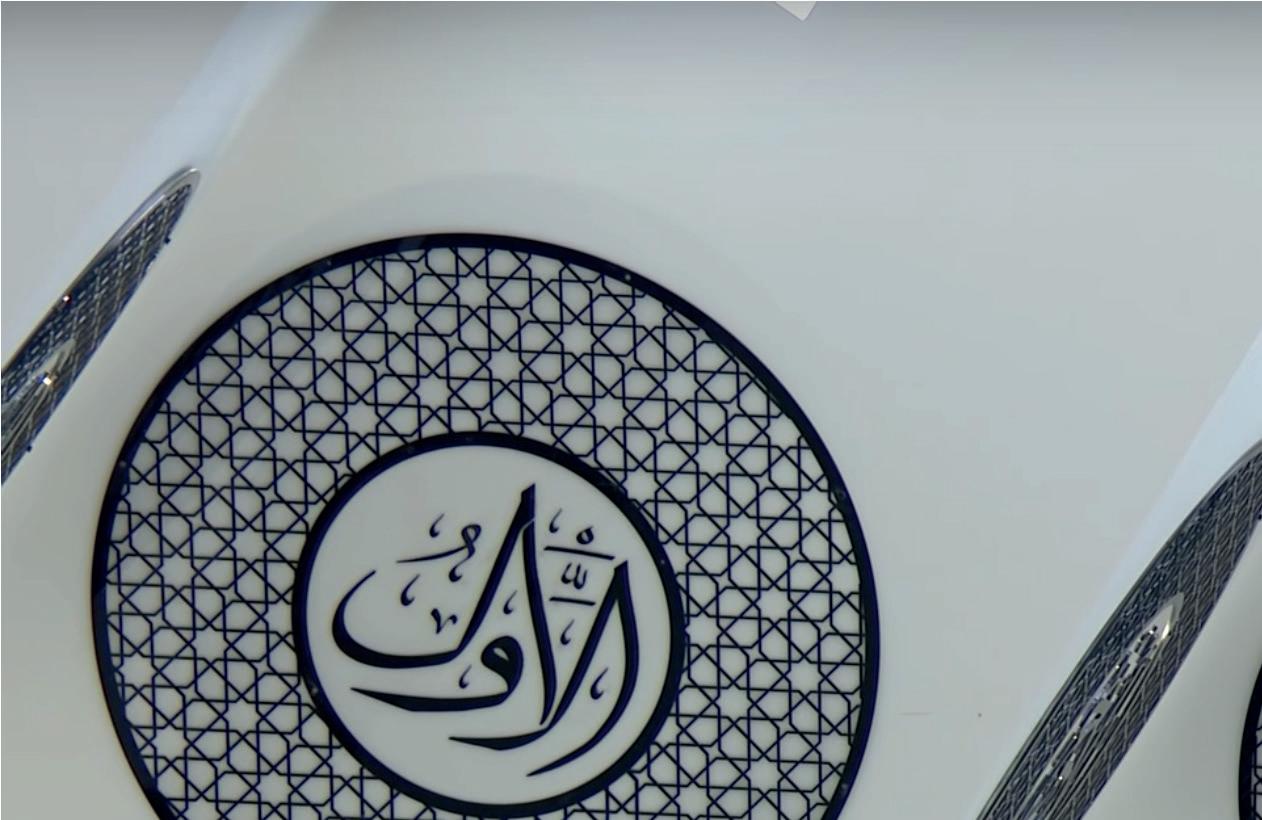
to drink water from it. On that day, every single person who drank from the reservoir was killed except for Hakim bin Hizam, who later accepted Islam. And whenever he would swear an oath, he would say: “I swear by the One Who saved me on the Day of Badr.” (Ibn Hisham, Sirat Ibn Hisham [Beirut, Lebanon: Dar al-Kutub al‘Ilmiyyah, 2001], p. 424)
With regards to arranging the rows for battle, it is mentioned that the Holy Prophetsa arranged the companions in rows for battle in the morning before the Quraish arrived. The Holy Prophetsa was arranging the rows using an arrow, and with it he would gesture to move forward or to step backwards so they became straight. The Holy Prophetsa handed the banner to Hazrat Mus’ab bin Umairra, who placed it where he was ordered to. When the Holy Prophetsa was arranging rows he was facing towards the West. (Mustafa ‘Abd al-Wahid, Subul al-Huda wa al-Rashad fi Sirat Khair al‘Ibad, Dhikr Ghazwat Badr, Vol. 4 [Beirut, Lebanon: Dar al-Kutub al-‘Ilmiyyah, 1993], p. 33)
During this time, while he was arranging the rows, an extraordinary incident related to Hazrat Suwad bin Ghaziyyahra took place, which demonstrated his love and affection for the Holy Prophetsa. It is written that during the Battle of Badr, when the Holy Prophetsa was arranging rows, he passed by Suwad bin Ghaziyyahra, who was outside of his row. The Holy Prophetsa pressed the arrow against his stomach and said: “O Suwad! Step in line.” Hazrat Suwadra said: “O Messengersa of Allah! You have caused me pain. Allah the Almighty has appointed you for the sake of upholding justice and equity. I wish to exact retribution, you hit me on my stomach with an arrow.” The Holy Prophetsa lifted the cloth from his stomach and said, “Take your revenge.” Hazrat Suwadra embraced the Holy Prophetsa and began kissing his body. The Holy Prophetsa said: “O Suwad! Why have you done this?” Hazrat Suwadra submitted: “O Messengersa of Allah! You can see what hour this is (i.e., it is time for war). I do not know if I will survive or not. I wished for my last moments to be spent wherein my body touches your blessed body.” (‘Ali bin Burhan al-Din alHalabi, Al-Sirah al-Halabiyyah, Vol. 2, Bab Dhikr Maghaziyah [Beirut, Lebanon: Dar al-Kutub al-‘Ilmiyyah, 2002], 220-221)

The Holy Prophetsa subsequently prayed for him. These were incidents of absolute love and devotion. The remaining incidents will be narrated in the future, insha-Allah
Now I wish to mention some deceased members, the first of whom is respected Qari Muhammad Ashiq Sahib, who was a lecturer at Jamia Ahmadiyya and also oversaw Madrassatul Hifz as its Principal. He recently passed away at the age of 85.
نوعجر هيلا اناو هلل انا
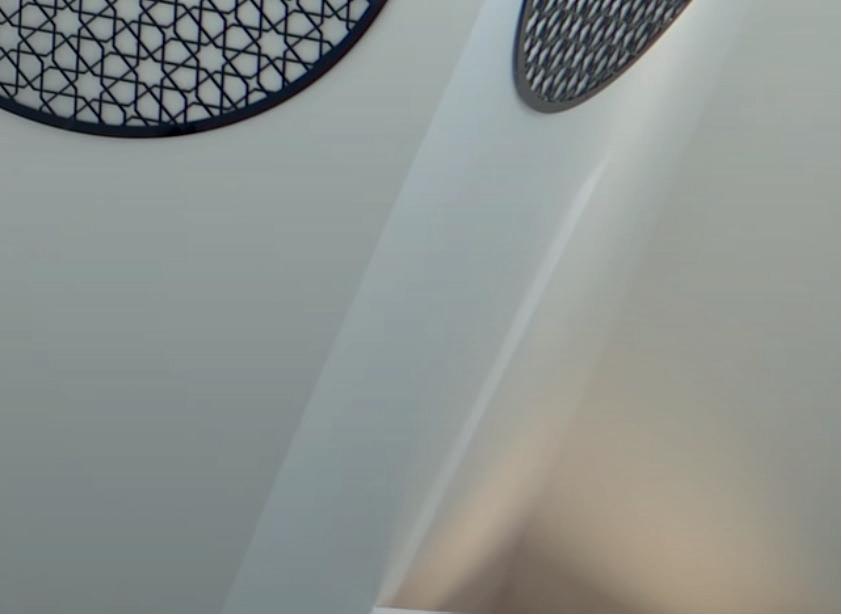

[Surely, to Allah we belong and to Him shall we return.]

By the grace of Allah the Almighty, he was a musi. After committing the Holy Quran to memory and learning its correct recitation, he taught at different madrassas of the Ahl-e-Hadith in various places in Pakistan before he accepted Ahmadiyyat. He accepted Ahmadiyyat of his own accord. Before pledging allegiance, Qari Ashiq Sahib belonged to the Ahl-e-Hadith sect. Qari Sahib had a book written about his own life
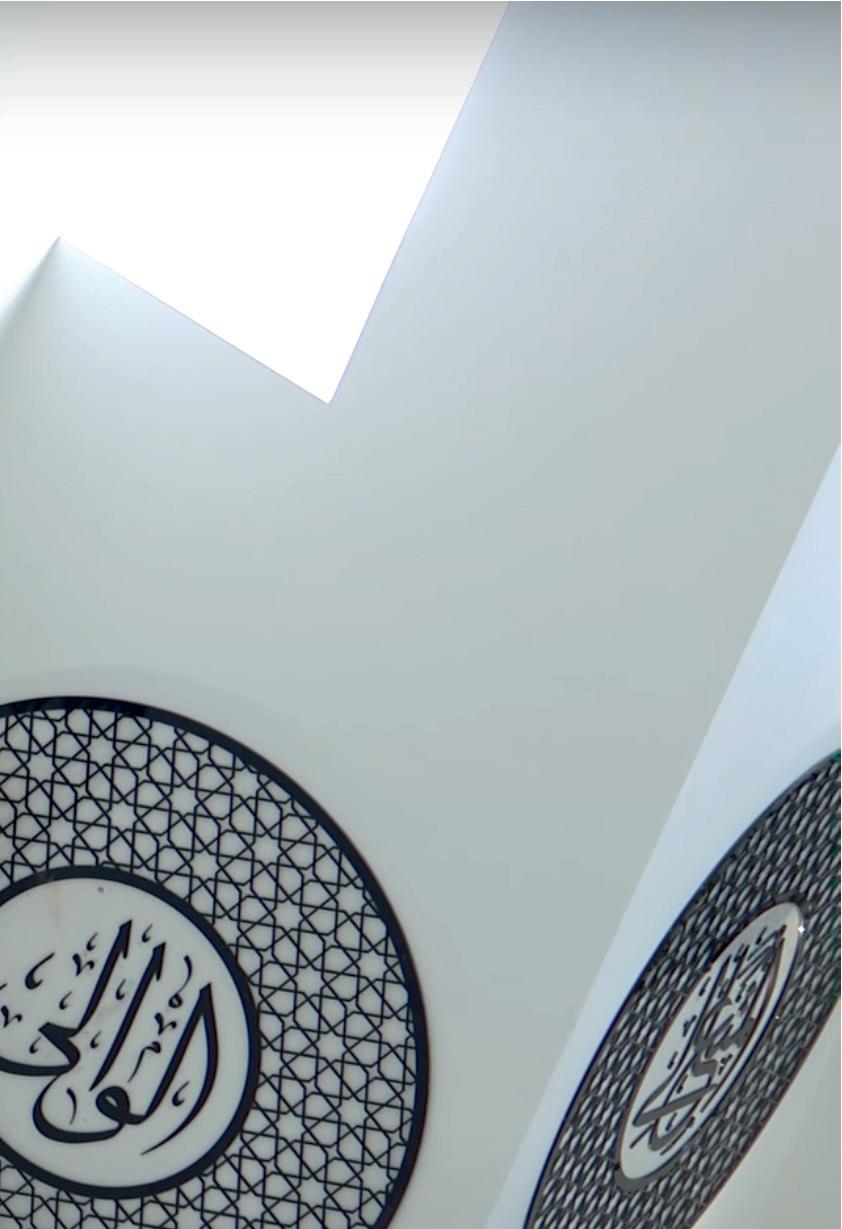
Friday 21 July 2023 | AL HAKAM 22
in which he states: “In 1957, when I used to live in Karachi, I had some scholarly friends with whom I used to interact and would often go to them. There, I would read the newspaper and sit with some of the scholars as well. One day, as I was sitting there and reading the newspaper, someone who was studying a book of the Promised Messiahas said, ‘This is amazing.’ I asked, what was so great about it? He said, ‘Our scholars believe that certain Quranic verses can be abrogated, whereas Mirza Ghulam Ahmad Qadiani Sahib says that not even a single iota of the Holy Quran has been abrogated.’”
Qari Sahib says, “This made me curious, so I decided to do some research to find out whether he was truthful or false.” Then, in the autobiography he had written, he says, “One day, in order to learn more about Ahmadiyyat, I went to the Ahmadiyya Hall in Karachi after prayers, where I met an Ahmadi. I told him that I wished to seek more information about certain matters in which we had differences of belief and requested that he help guide me. There was someone sitting there who took me from the Ahmadiyya Hall to his home. He gave me some books to read, and so I studied them and even showed a book to one of my scholarly friends, saying that this was exactly in accordance with Islam. The cleric said, ‘You have a very simple disposition; you are not aware, so I will inform you that the things that Mirza Sahib has written in his smaller books accord with Islam and these are the books that he wrote earlier on. However, in the lengthier books that Mirza Sahib wrote later on, he has written false thoughts and beliefs.” However, Barahin-eAhmadiyya was written right at the outset and exactly according to Islam, as were the other books. In any case, Qari Sahib returned to his contact and asked for a lengthier book, however, he presented some excuse and did not give a lengthier book, despite the fact that there is no discrepancy among the books of the Promised Messiahas, whether they are books from the beginning or those that were written later on. Allah the Almighty knows best what that Ahmadi’s reason was for not providing the books. In any case, Qari Sahib lost contact with him. Then, according to Qari Sahib’s autobiography, God’s special decree created a certain passion within his heart and Qari Sahib visited Rabwah on various occasions and kept in touch with the local Ahmadis. He also continued to pray and it was in this prayerful state that he saw many dreams. One of these dreams was:
حيسملا ءاج ءامسلا توص اوعمسإ
“Hearken to the call of the heavens; the Messiah has come!”
Qari Sahib says, “At the time, these words did not draw my attention towards Ahmadiyyat, however, after becoming an Ahmadi, I realised that those dreams were fulfilled.” This was also one of the many dreams that he saw. Qari Sahib writes, “When I look back at my life, I realise that it was nothing but the grace of Allah the Almighty that my attention was constantly drawn towards Ahmadiyyat and I was bestowed guidance.”
He then writes, “I met Sheikh Abdul Qadir Saudagarmal Sahib, a missionary serving in Lahore at the time, at an Ijtema [gathering] of Majlis Ansarullah.” He says, “On the first day of the Ijtema (at the time he
had not yet pledged allegiance) I attended all of the programmes. Either on the second or third day of the Ijtema, I expressed my desire to pledge allegiance. Hence, we went to the office of Islah-o-Irshad Markaziyyah, where I completed the bai’at form and was thus enlightened with the light of Ahmadiyyat.” (Meri Dastan Martabah Hafiz Masroor Ahmad wa Muhammad Maqsood Ahmad, pp. 11-22, Zia al-Islam Press, , January 2013)
After accepting Ahmadiyyat, he had to face many trials, further compounded by the pressure from his non-Ahmadi students and teachers, who were trying to lure him back by even presenting him with various enticements and also inflicting hardships. Qari Sahib says, “After accepting Ahmadiyyat, I faced many difficulties along the way, however, Allah the Almighty kept me steadfast, and I continued to tread upon the path which He had taught. Allah the Almighty’s guidance was there, which is why no worldly enticement could lure me away from the true path. Many attempts were made to distance me from the Ahmadiyya Jamaat and to lure me back to the Ahl-e-Hadith, however, by the grace of Allah, despite their great attempts, they failed in their attempts to lure me back because of the degree of faith which I had attained.” (Ibid., p. 27)
He married a widow who already had three children. He also had one daughter with her. With regards to his services to the Jamaat he writes, “I met Sufi Khuda Bakhsh Zirvi Sahib at the mosque one day and he told me that Hazrat Mirza Tahir Ahmadrh, who was the Waqf-e-Jadid in-charge at the time, sent a message for him to take me to Rabwah.” He had pledged allegiance by this time. He says, “When I went to him, he first listened to my recitation of the Holy Quran and then assigned me the duty of teaching the mu’allimin of Waqfe-Jadid the recitation of the Holy Quran with the proper rules and also arranged my accommodation in Waqf-e-Jadid. This was in 1964.” (Ibid., pp. 27-28)
He says that he was officially appointed as a mu’allim under Waqf-e-Jadid in January 1965. During this time, the finalyear students of Jamia Ahmadiyya used to come to him at the Waqf-e-Jadid office to study the Holy Quran. Later, upon the request of respected Mir Daud Ahmad Sahib, who was the Principal of Jamia Ahmadiyya at the time, Qari Sahib started teaching at Jamia Ahmadiyya. Along with Jamia, he also taught at the Nusrat Girls College, which was a college of the Jamaat, while observing the requirements of purdah [the veil]. (Ibid., pp. 35-36)
In January 1969, Hafiz Shafiq Sahib, who was the person in-charge of the Hafiz Class passed away, and so the Jamia Principal Mir Daud Ahmad Sahib asked Hafiz Sahib to teach the class. In those days, this class used to be taught in Masjid Mubarak. I also remember that the boys would be sitting in the mosque committing the Holy Quran to memory. Then, Hazrat Khalifatul Masih IIIrh also appointed Qari Sahib to the Hafiz Class. He granted approval and also wrote that he would continue teaching in Waqfe-Jadid while also teaching the Hafiz Class. Hence, on 11 June 1969 he was officially appointed to the Hafiz Class. (Ibid., pp. 4041)
He retired in 1998. (Ibid., p. 52)
However, he continued teaching at Madrassatul Hifz and Madrassatuz Zafar until 2019. On the blessed occasion of Jalsa Salana 1964, he had the opportunity to recite the Holy Quran for the first time [at Jalsa Salana].
Qari Sahib writes that in February 1965, he had the honour of meeting Hazrat Khalifatul Masih IIra. In relation to this historic meeting, he would say, “I had the opportunity to shake his hand and this was a life-changing moment for me. The Private Secretary introduced me to Huzoor and said, ‘This is Qari Muhammad Ashiq Sahib, who has recently converted to Ahmadiyyat.’ Whilst he was introducing me, Huzoor was looking upon me in a very loving manner and at the same time I was also looking at him whilst holding his blessed hand.” (Ibid., pp. 28-30)
For a period of 15 years, Qari Sahib was assigned the duty of leading the Taravih prayer in the Mubarak Mosque during the blessed months of Ramadan. Maulana Abdul Malik Khan Sahib, Nazir Islah-oIrshad Markaziyyah, once said to him that the reason why he was always assigned the duty of leading the Tahajjud and Taravih prayers was that Hazrat Khalifatul Masih IIIrh liked his recitation of the Holy Quran. (Ibid., pp. 35-37)
He has many students who are now living in various parts of the world. They have also sent me their letters about him and how they benefitted from his qualities and knowledge. May Allah the Almighty elevate the rank of the deceased and enable his progeny to also instil the habit of prayer and sincerity, just as he desired.
The next mention is of Noor-ul-Din Al-Husni Sahib, who was a long-standing member of the Ahmadiyya Community in Syria and was currently residing in Saudi Arabia. For many years, he was imprisoned in Saudi Arabia owing to his being an Ahmadi. Despite his illnesses and the hardships he had to endure, he remained steadfast upon his faith and he passed away whilst still in prison on 25th May at the age of 82.
[Surely, to Allah we belong and to Him shall we return.]
The deceased’s father, Al-Hajj Abdul Rauf Al-Husni Sahib, did the bai‘at in 1938. The late respected Munir Al-Husni Sahib, former Amir of Jamaat in Syria, was the elder brother of Noor-ul-Din Al-Husni Sahib’s father. Right from his childhood, the deceased grew up in an environment filled with Islamic morals and traditions and a love for Khilafat. The deceased was 13 or 14 years of age when his father passed away. He spent a lot of time in the company of respected Munir Al-Husni Sahib and learnt a great deal about the Jamaat from him. In 1955, when Hazrat Musleh-e-Maudra visited Damascus, he stayed at the house of the deceased’s uncle, Badr-ul-Din Al-Husni Sahib. During these days, the deceased also had the opportunity to recite the Holy Quran before Hazrat Musleh-e-Maudra. He regularly kept fasts, particularly on Monday and Thursday. He had a great passion for the recitation of the Holy Quran. He never missed a single Tahajjud prayer. Even up until his final moments in prison, he remained steadfast upon his faith and attached to the Jamaat. He had complete
faith that the help of Allah the Almighty would soon arrive. He would mention this to everyone who would meet him in prison. He is survived by his wife, who is not an Ahmadi, however, she remained loyal to her husband and offered a lot of sacrifices during the duration of his imprisonment. He has three sons, Abdul Rauf Al-Husni Sahib, Muhammad Maaz Al-Husni and Fawaz Al-Husni as well as a daughter, Zainab Al-Husni. He leaves behind many grandchildren and by the grace of Allah the Almighty, they are all sincere Ahmadis.
The deceased’s son, Maaz Al-Husni Sahib, says, “My father wanted all of us siblings to become fully satisfied and then enter the Jamaat and all praise is due to Allah; we have done the bai‘at with complete faith. When he was in Saudi Arabia, he searched for the Jamaat and he eventually met the late Hashim Sahib, (who lived in the UK and was working in Saudi Arabia). He remained in contact with him and, until his last breath, remained engaged in Jamaat work. He was very kind and openhearted and he would like to always help others.”
He further says, “In 2019, he was summoned and then imprisoned. After a great deal of effort and struggle, we eventually learnt that our father had been imprisoned for being an Ahmadi and for doing tabligh on social media. For two years, we made every effort to try and get him released from prison and sought the help of many lawyers. They also passed a verdict for his release and he came out of prison as well, but just a few hours later, the police called him and told him to come to the police station, where they arrested him once again. This time, they made him endure even greater hardships than before. He was not allowed to meet anyone and was not even allowed to speak to anyone on the phone. Due to his old age, his health was very frail and he would often go to the hospital, but even then he was not able to meet his family members.”
His eldest son, Abdul Rauf Al-Husni, who lives in Canada, says that he had a bond of great sincerity and loyalty with the Jamaat. He was very firm on his beliefs and he also made particular mention of his worship and sincerity. He has mentioned some further details and writes that in 2016, when he was imprisoned, he was fasting at the time, and even then, he did not break open his fast despite knowing that he would have to endure a lot of hardship in prison. When the prison officer offered him water, he told him that he was fasting. He then sought permission so he could offer his Asr prayer and the officer granted him permission. He then offered his prayer in front of him, upon which the prison officer remarked that he prayed just like they did. In any case, this had such an impact on him that he released him at the time. Later, in December 2019, the police arrested him again without telling him the reason and he passed away whilst in prison. May Allah the Almighty grant him His forgiveness and mercy and elevate his rank. May Allah the Almighty also enable his progeny to adopt his good deeds and qualities. After the Friday prayers, I shall lead their funeral prayers [in absentia].
(The official Urdu transcript published in The Daily Al Fazl International, 14 July 2023, pp. 2-7. Translated by The Review of Religions.)
23 AL HAKAM | Friday 21 July 2023
نوعجر هيلا اناو هلل انا
Programme Jalsa Salana UK 2023
(provided by Jalsa Gah Offi ce)
Friday 28 July 2023
11:30 | Lunch and preparation for Jumu’ah prayer
13:00 | Jumu’ah and Asr prayers
16:25 | Hoisting of Liwa-eAhmadiyyat
16:30 | Recitation from the Holy Qur’an, Urdu translation, Urdu Poem, Persian poem & Urdu translation
Inaugural address by Hazrat Amirul Momineen Khalifatul Masih V (May Allah be his Helper)
19:30 | Dinner
21:15 | Maghrib and Isha prayers
Saturday 29 July 2023
03:00 | Tahajjud Prayer
04:20 | Fajr Prayer
08:00 | Breakfast
Second Session
10:00 | Recitation of the Holy Qur’an, Urdu translation & Urdu poem
10:20 | Need for the Imam in Light of the Writings of the Promised Messiah (English) by Mr. Muhammad Ibrahim Ikhlaf, Secretary Tabligh, Jama’at Ahmadiyya, UK
10:50 | Scientific Proofs of the Existence of God (Urdu) by Dr Faheem Younus Qureshi, Naib Amir Jama’at Ahmadiyya, USA)
11:20 | Urdu Poem
11:30 | Khilafat is Surety of Order (English) by Dr Zahid Ahmad Khan, Sadr Qadha Board, UK
12:00 | Hazrat Amirul Momineen
Khalifatul Masih V (May Allah be his Helper) arrives in Ladies Jalsa Gah
Recitation from the Holy Qur’an, Urdu translation, Arabic Qaseeda with translation and Urdu poem
Announcement of Academic Awards.
Address by Hazrat Amirul Momineen
Khalifatul Masih V (May Allah be his Helper)
13:30 | Zuhr & Asr prayers
Third Session
15:15 | Brief Messages of Dignitaries
16:00 | Recitation from the Holy Qur’an, Urdu translation & Urdu poem
Address by Hazrat Amirul Momineen
Khalifatul Masih V (May Allah be his Helper)
19:30 | Dinner Sunday 30 July 2023
03:00 | Tahajjud Prayer
04:20 | Fajr Prayer
08:00 | Breakfast Fourth Session
10:00 | Recitation of the Holy Qur’an, Urdu translation & Urdu poem
10:20 | Excellent Example of the Holy Prophet as the Guarantor of World Peace (Urdu) by Dr Sir Iftikhar Ahmad Ayaz, Chairman International Human Rights Committee, UK
10:50 | Challenges Faced by Children in Schools and their Solutions (English) by Mr Azhar Haneef, Naib Amir & Missionary Incharge, Jama’at Ahmadiyya, USA
11:20 | Urdu Poem
11:30 | Intellectual Miracles of the Promised Messiah (Urdu) by Mr Ataul Mujeeb Rashed Imam of the London Mosque & Naib Amir, UK
12:00 | Efforts of Khulafa-eAhmadiyyat in Guiding World Powers towards Peace (English) by Mr Rafiq Ahmed Hayat Amir Jama’at Ahmadiyya, UK
12:30 | Announcement and Preperation for International Bai’at and Bai’at Ceremony
13:30 | Zuhr & Asr Prayers
Final Session
15:15 | Brief Messages of Dignitaries
16:00 | Recitation from the Holy Qur’an, Urdu translation, Arabic Qaseeda with translation and Urdu poem
Announcement of Academic Awards
Ahmadiyya Peace Prize announcement
Address by Hazrat Amirul Momineen
Khalifatul Masih V (May Allah be his Helper)
Silent Prayer
Ladies Jalsa Gah Programme
Saturday 29 July 2023
10:00 | Recitation of the Holy Qur’an, Urdu translation & Urdu poem
10:20 | Advancement of Lajna Imaillah under the Blessed Guidance of Khilafat (English) by Mrs Farzana Yousaf, Secretary Tabligh, Lajna Imaillah, UK
10:45 | Role of Ahmadi Women to Establish Peace in Society (Urdu) by Mrs Shermeen Butt, Muavina Sadr Press & Media, Lajna Imaillah, UK
11:10 | Urdu Poem
11:20 | My Journey to Ahmadiyyat, the True Islam (English) by Mrs Qudisa Ward
11:45 | Announcements
12:00 | Hazrat Amirul Momineen Khalifatul Masih V (May Allah be his Helper) arrives in Ladies Jalsa Gah
Recitation from the Holy Qur’an, Urdu translation, Arabic Qaseeda with translation and Urdu poem
Announcement of Academic Awards
Address by Hazrat Amirul Momineen Khalifatul Masih V (May Allah be his Helper)
Friday 21 July 2023 | AL HAKAM 24
Nasir
M Adam Ahmad | Design: Tahmeed Ahmad | © Al Hakam 2023
Editor-in-chief: Qaasid Muin Ahmad | Executive editors: Ataul Fatir Tahir, Aqeel Ahmed Kang | Research coordinator: Awwab Saad Hayat | Associate editors: Jalees Ahmad, Ata-ul-Haye
Translations:




 Jalees Ahmad Al Hakam
Jalees Ahmad Al Hakam
























































 Ali Fatty Student Jamia Ahmadiyya International Ghana
Ali Fatty Student Jamia Ahmadiyya International Ghana







